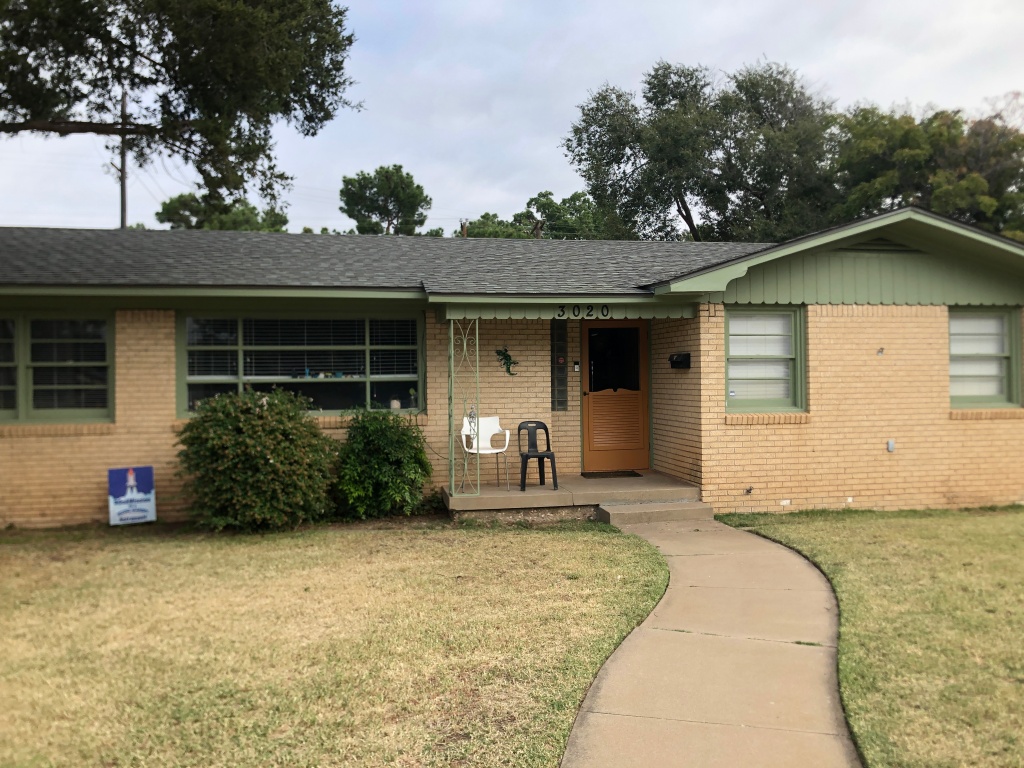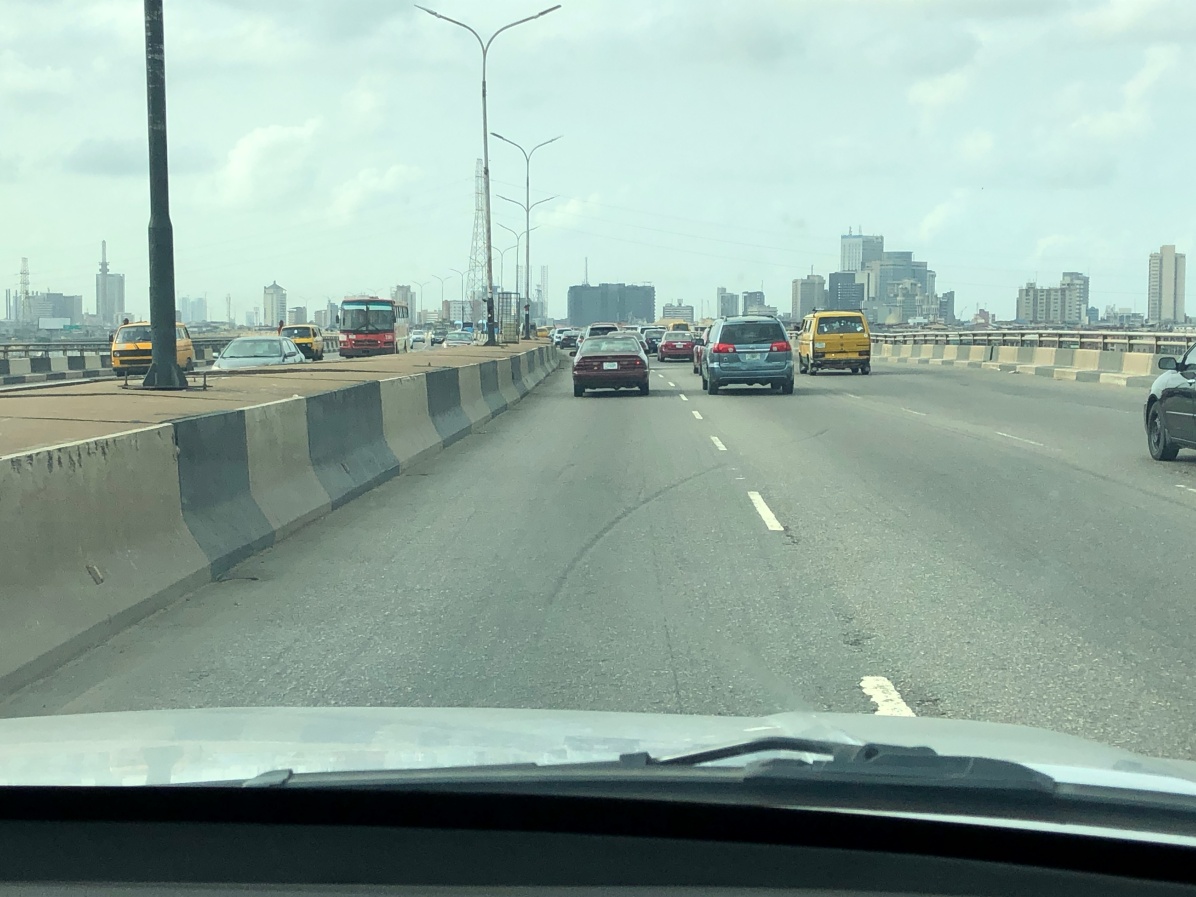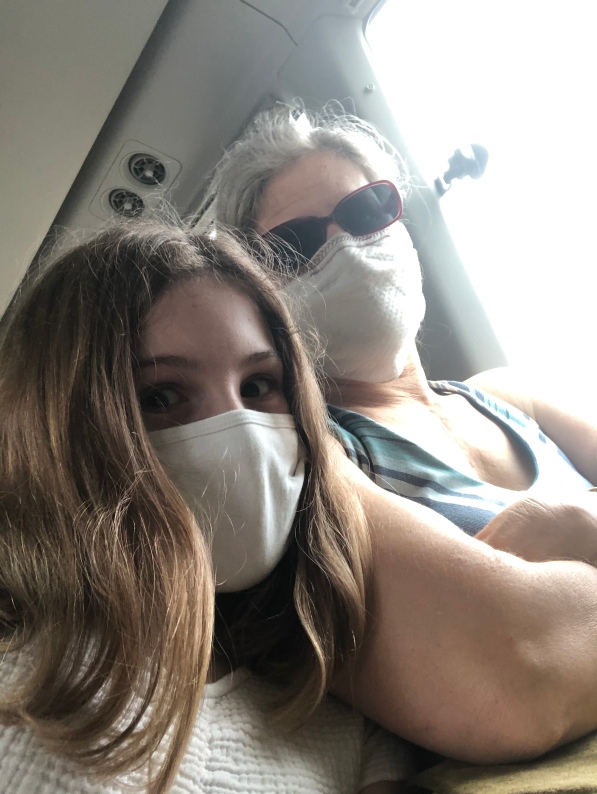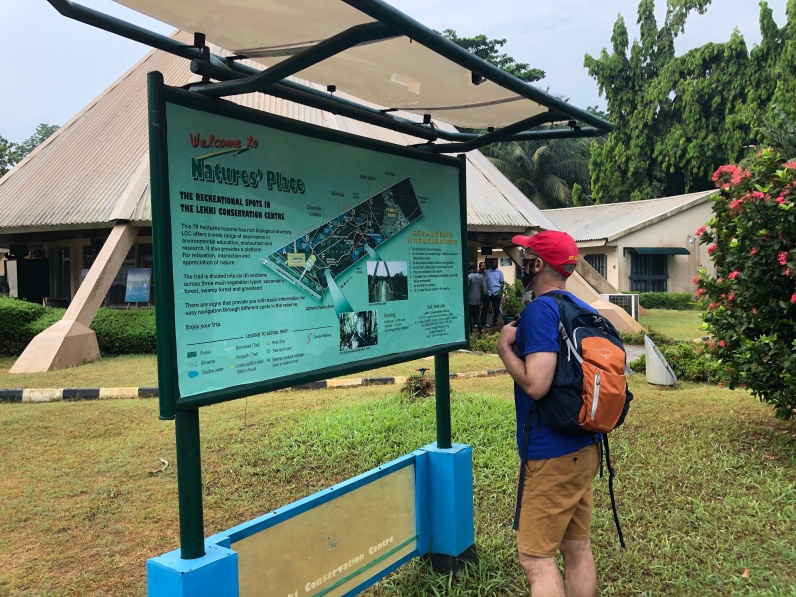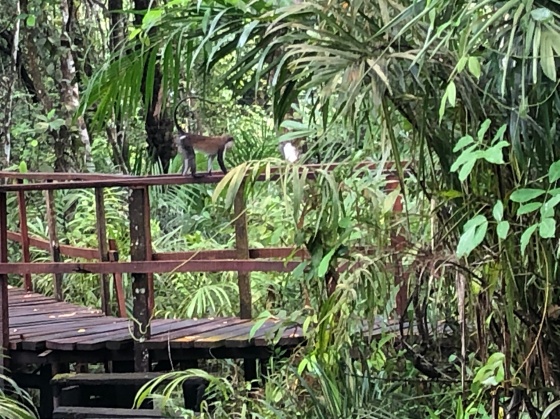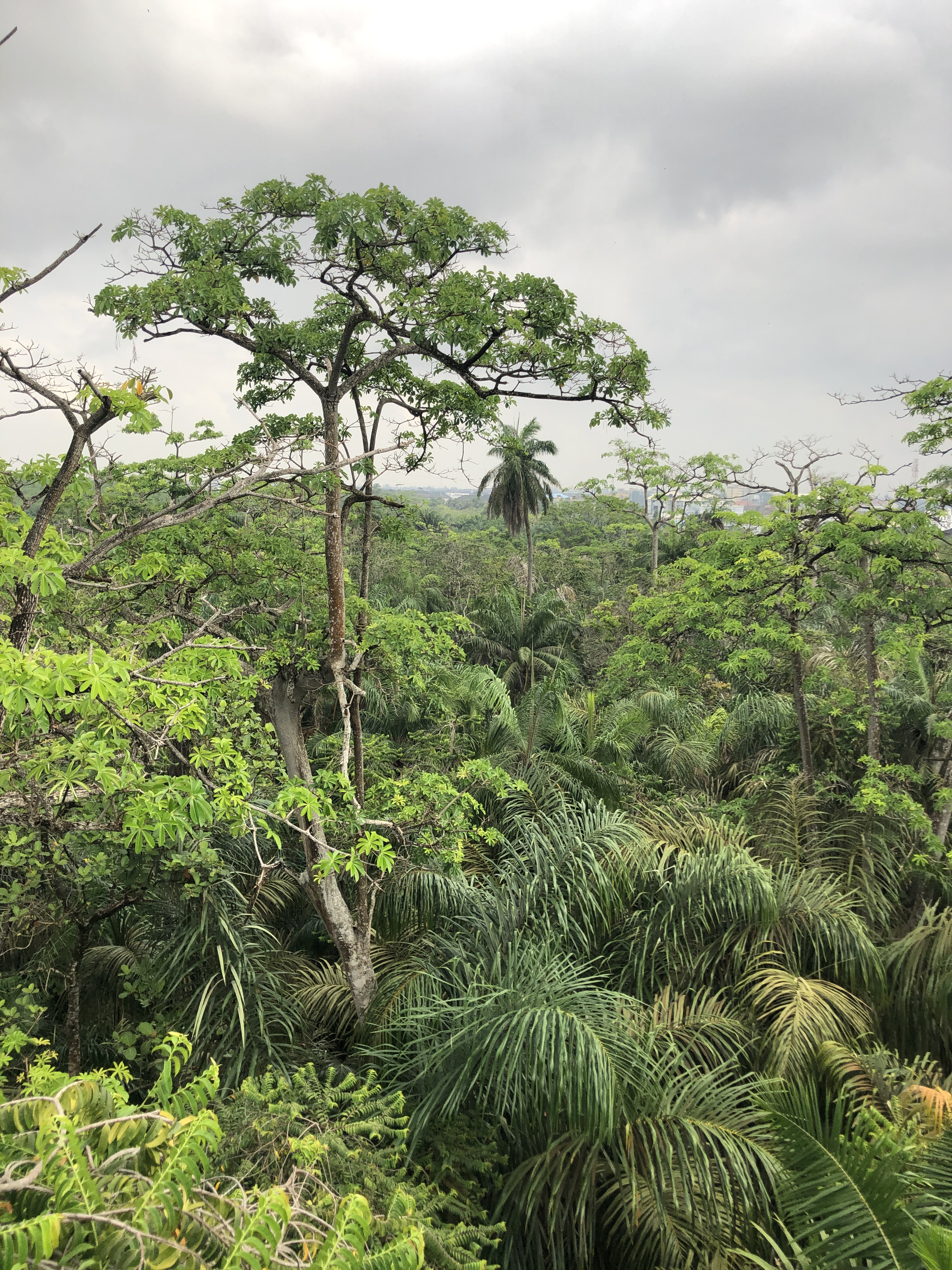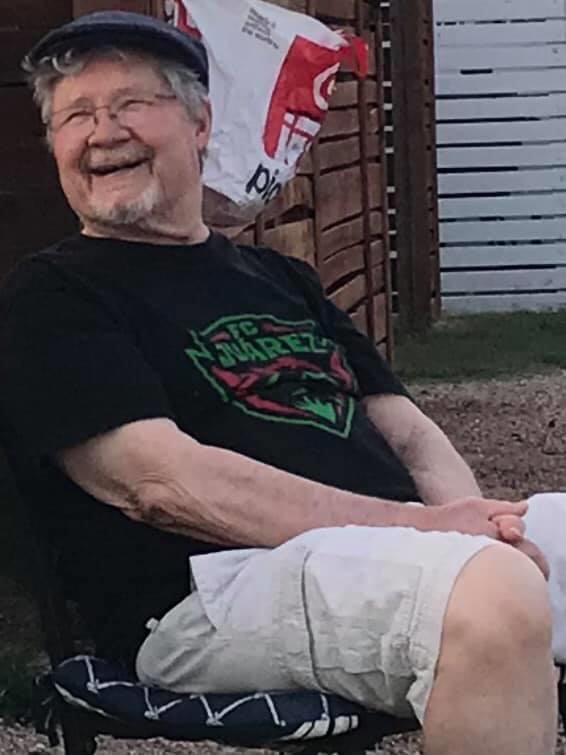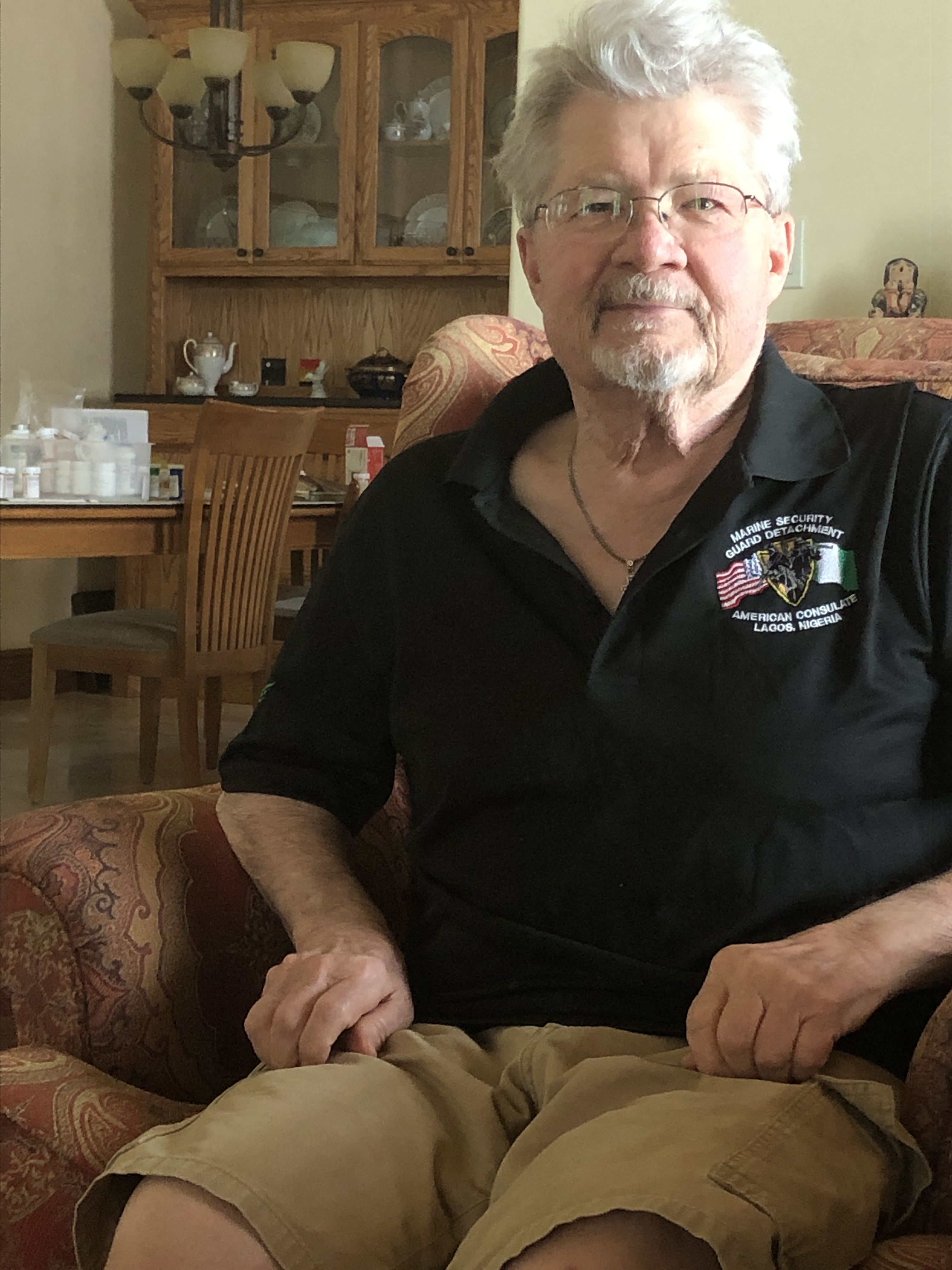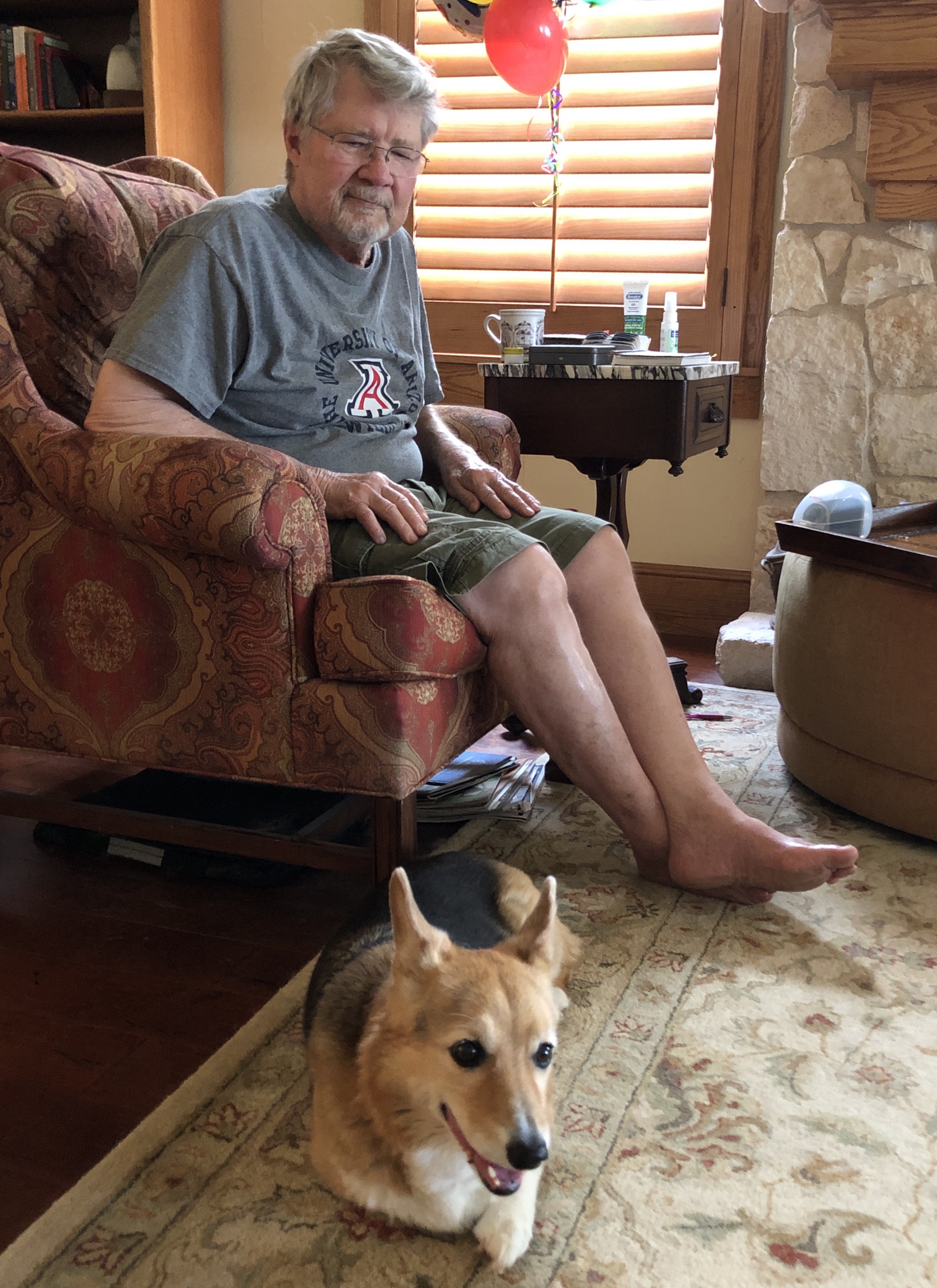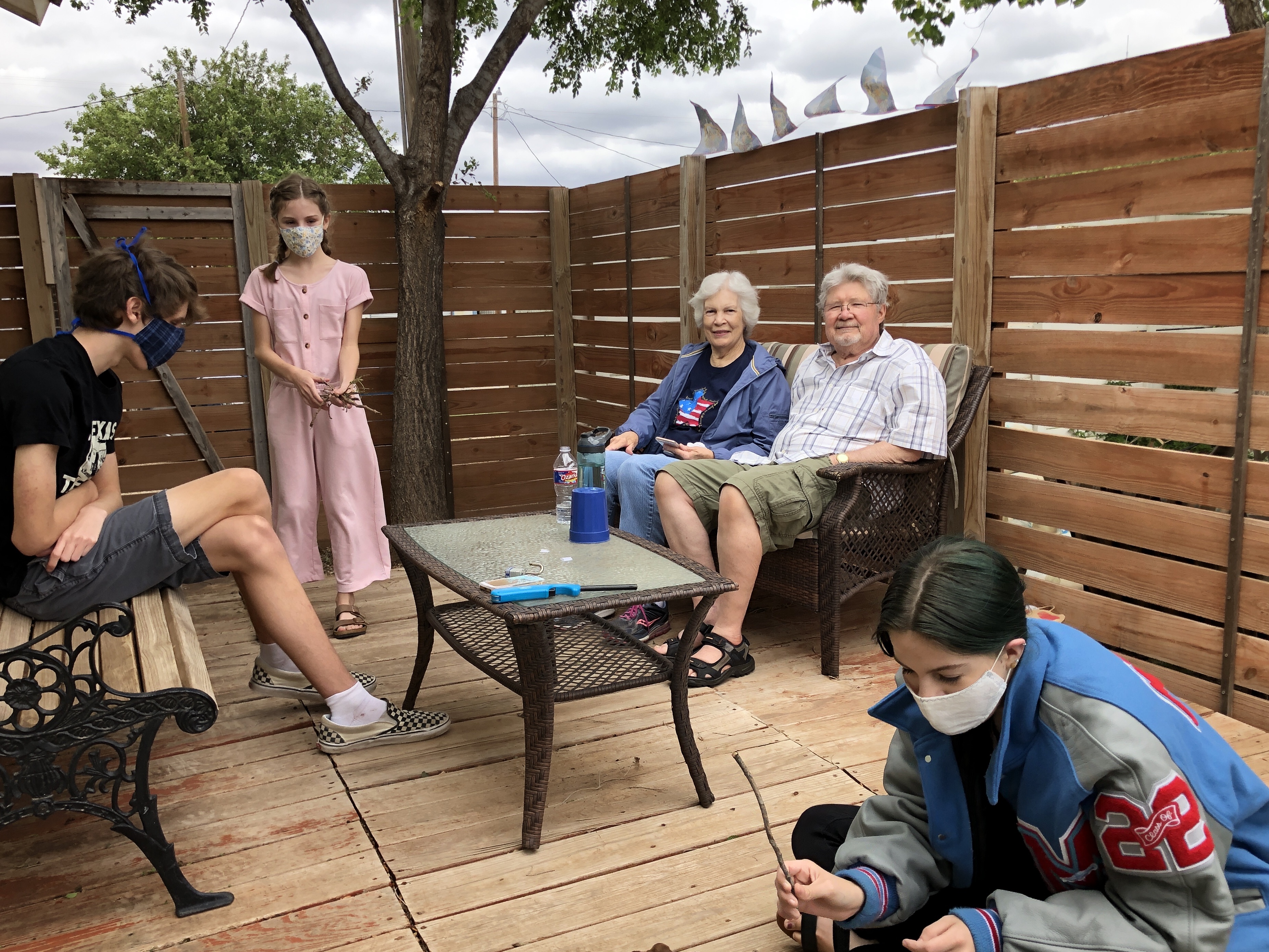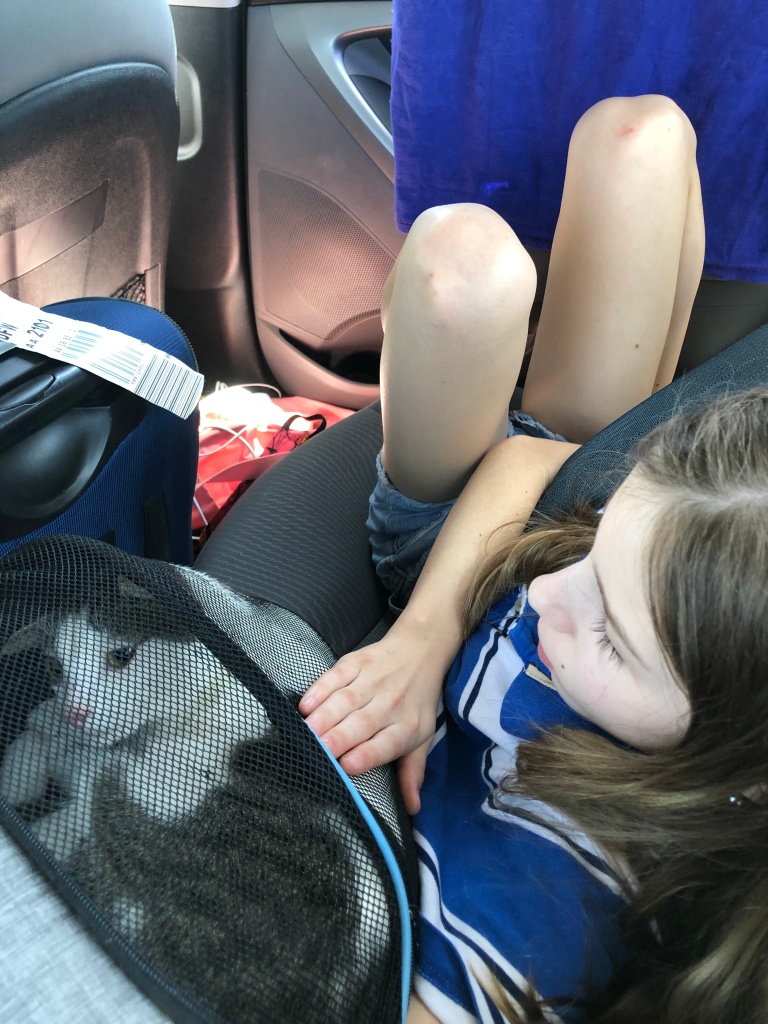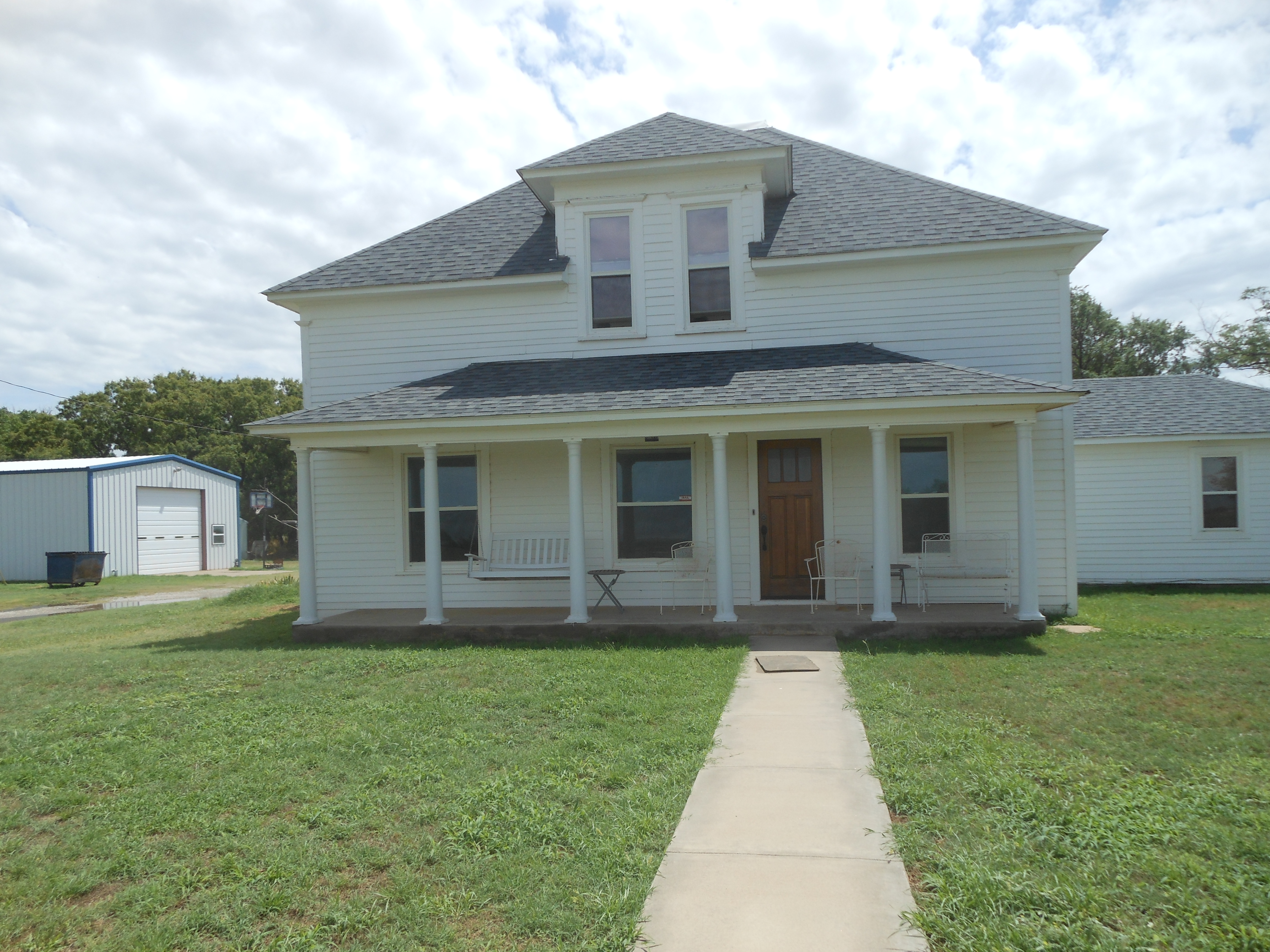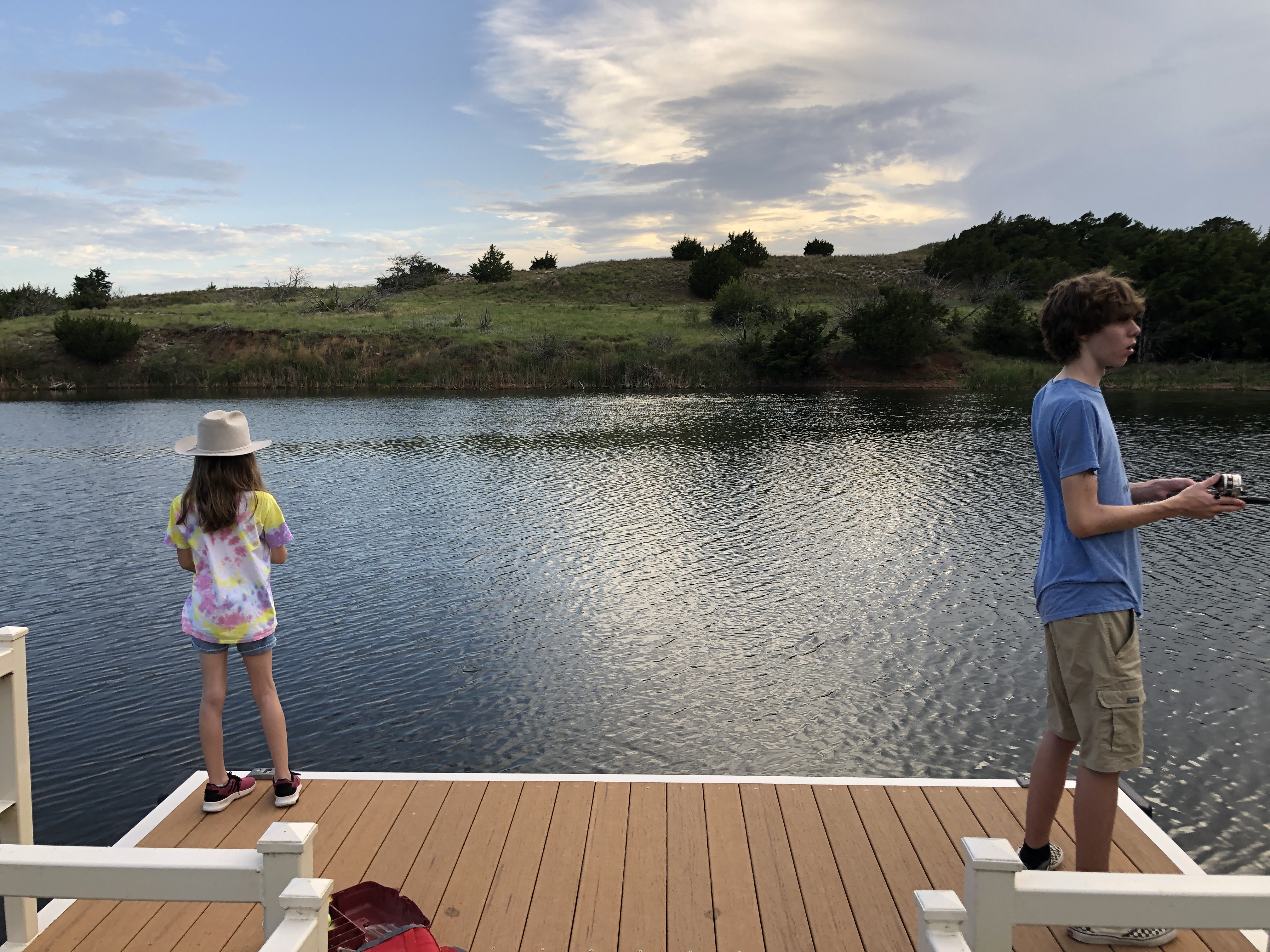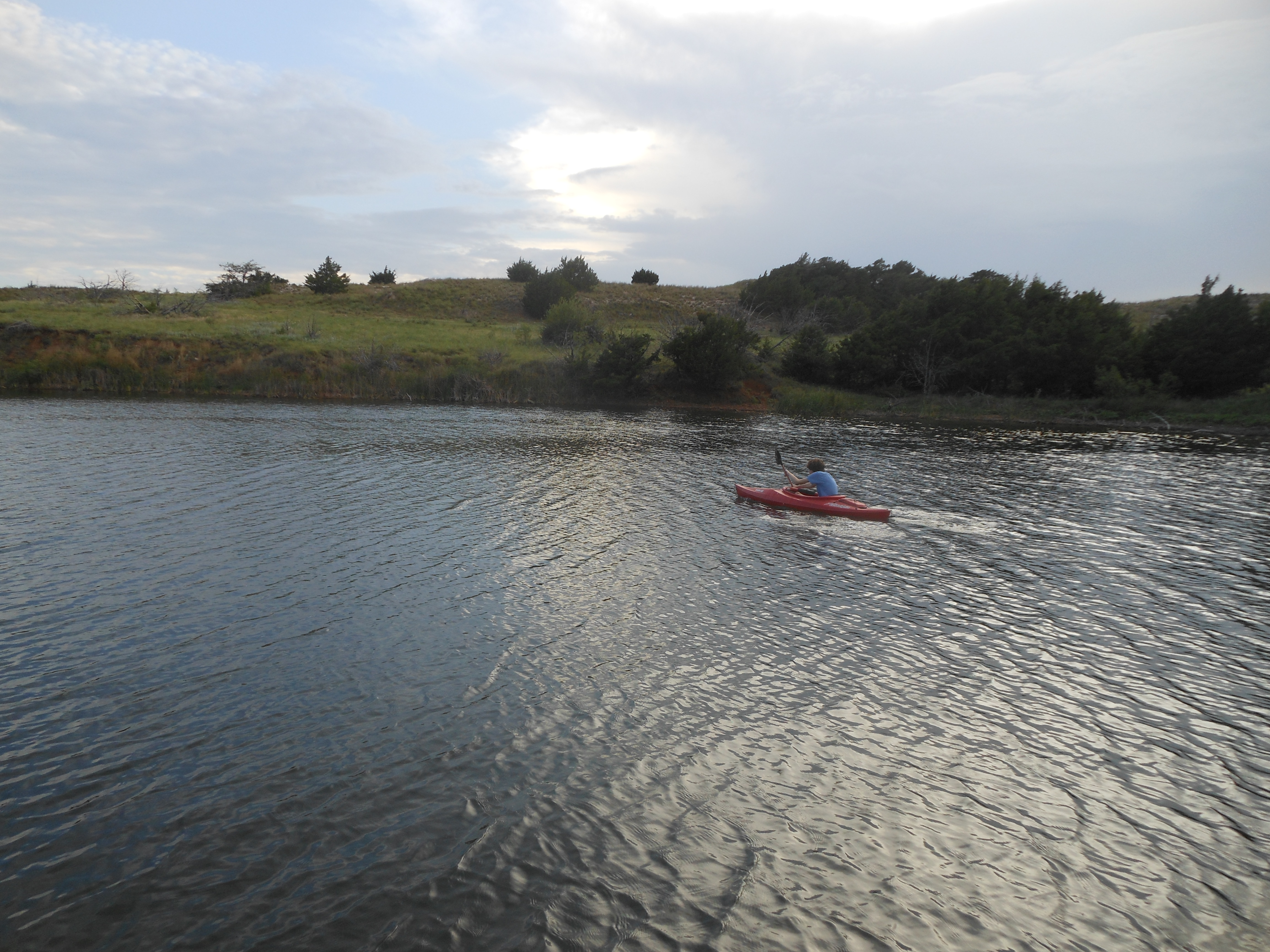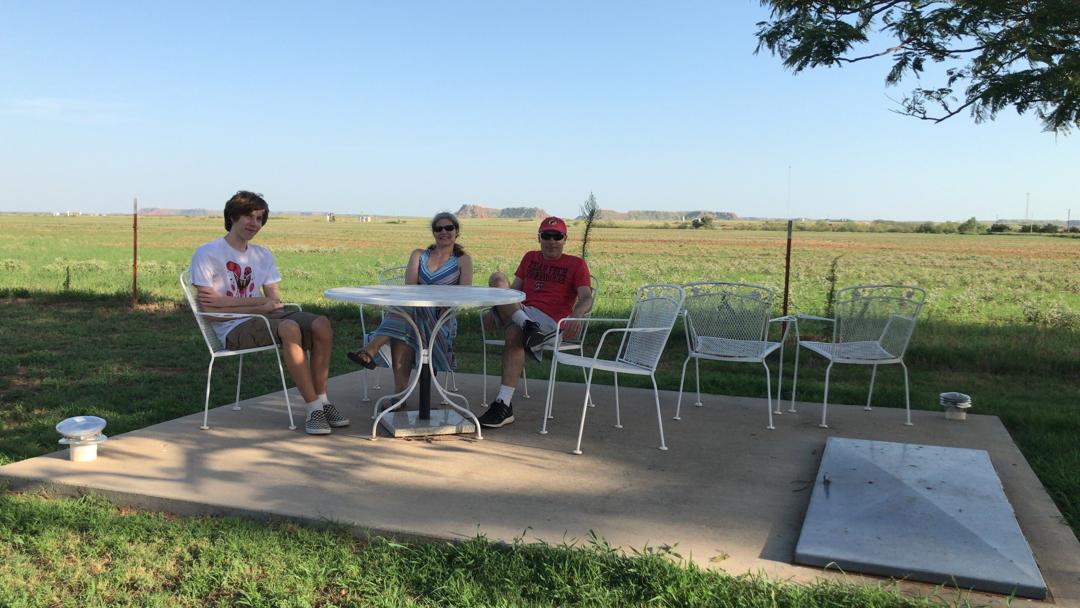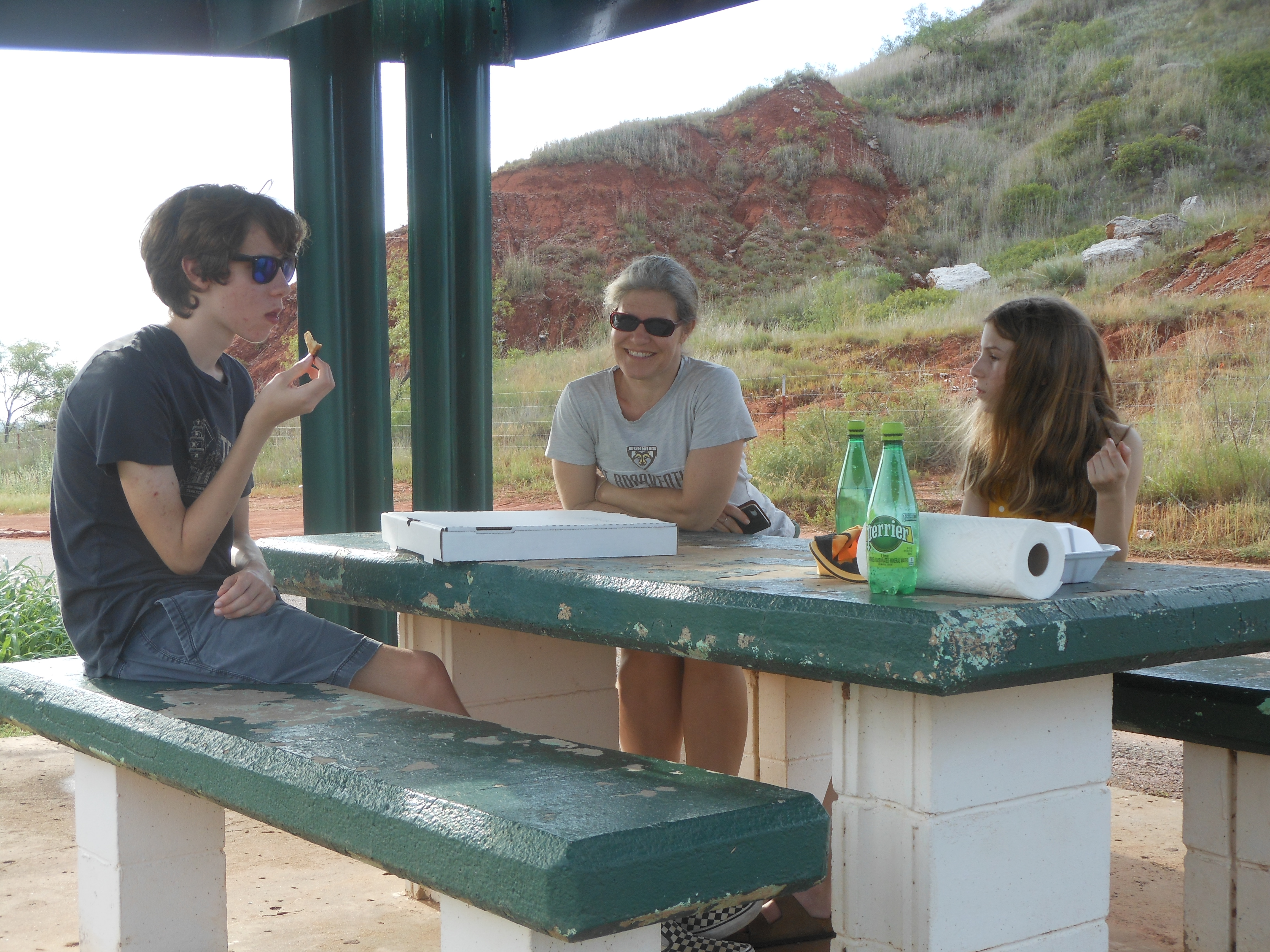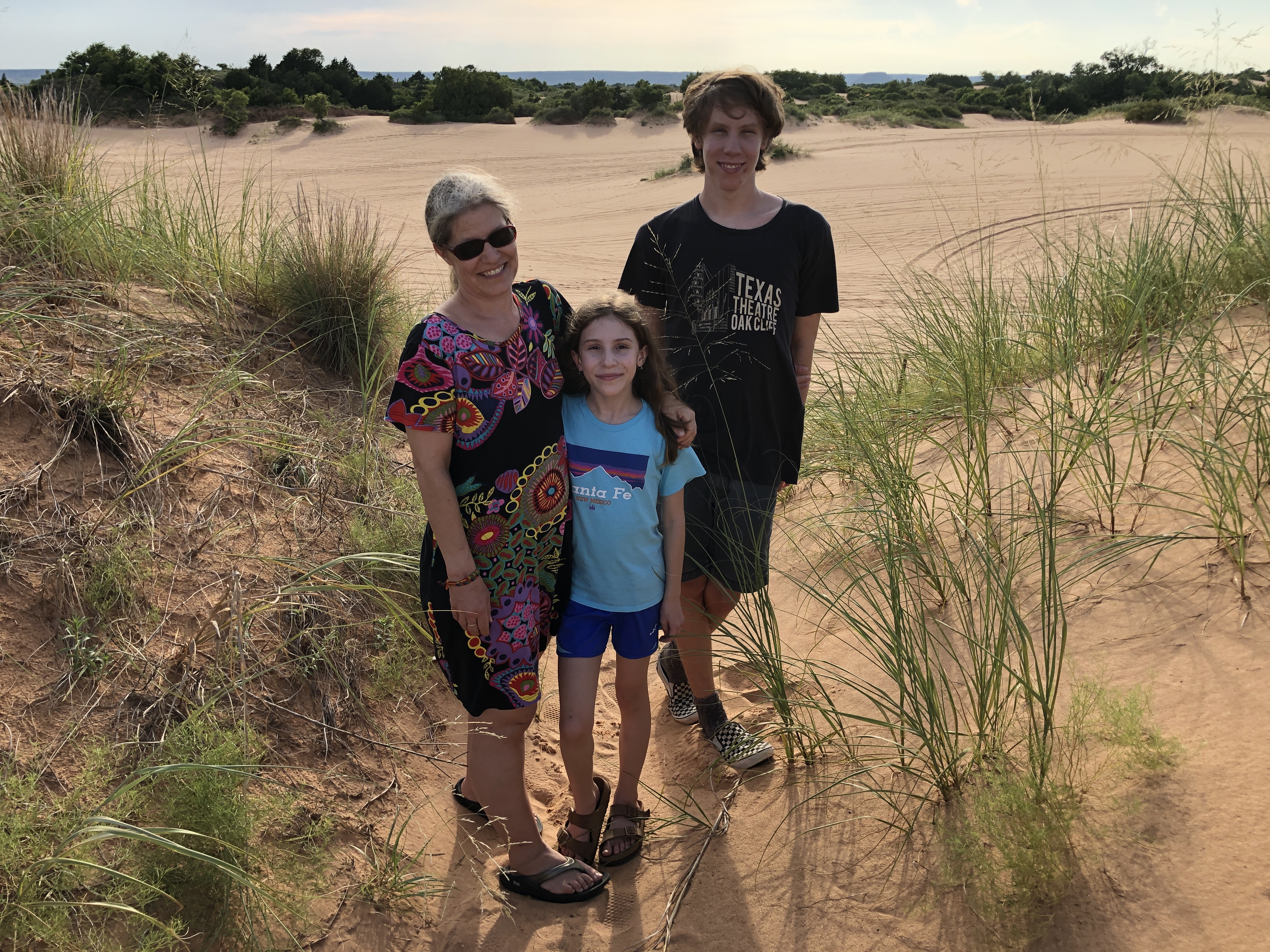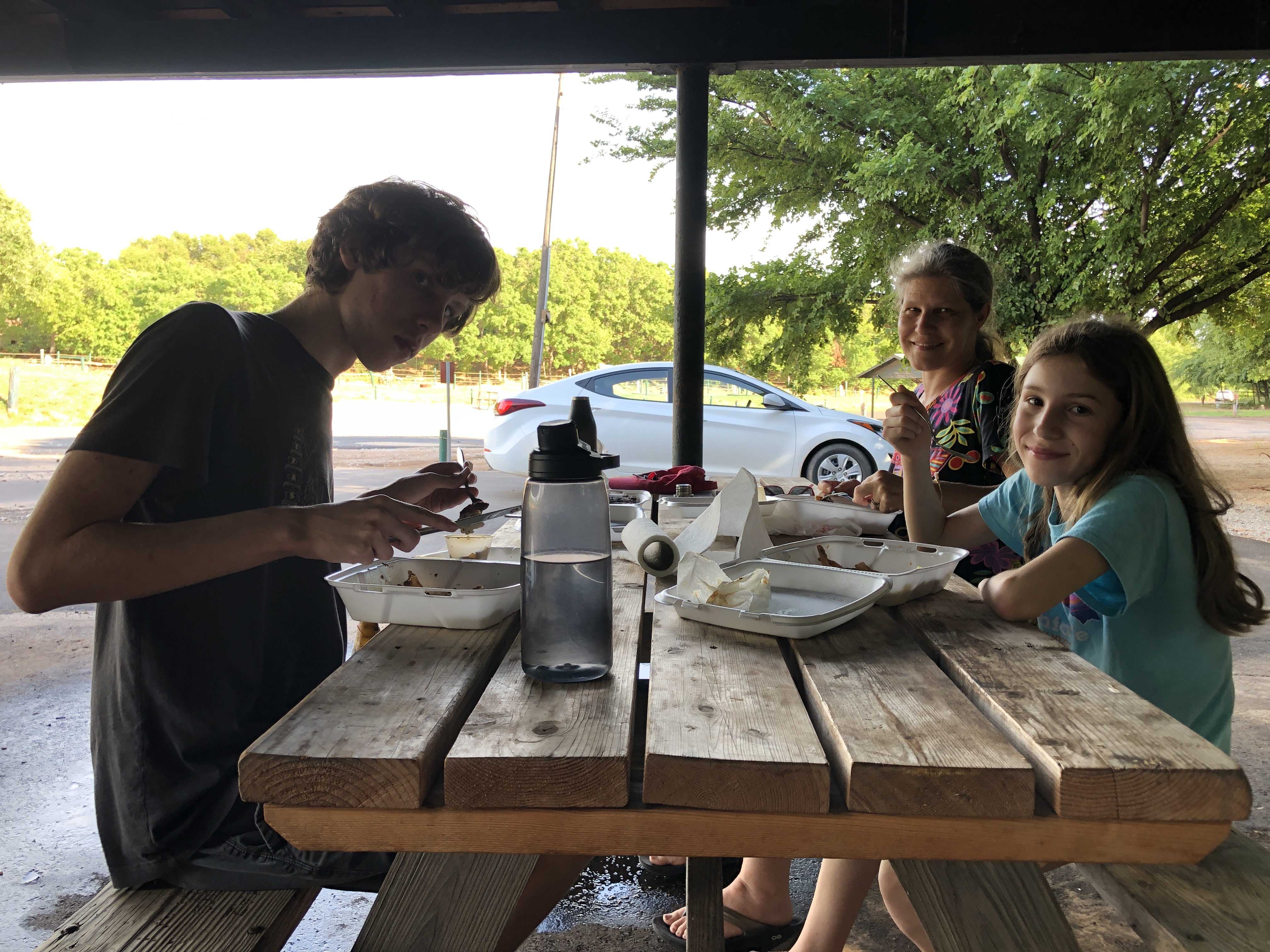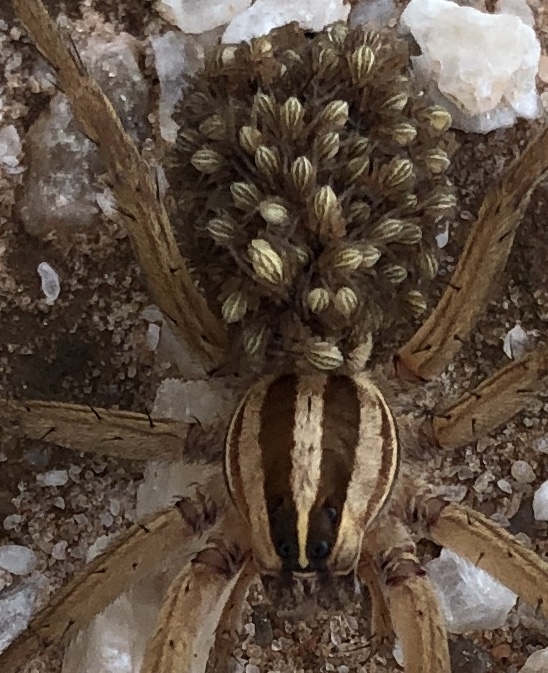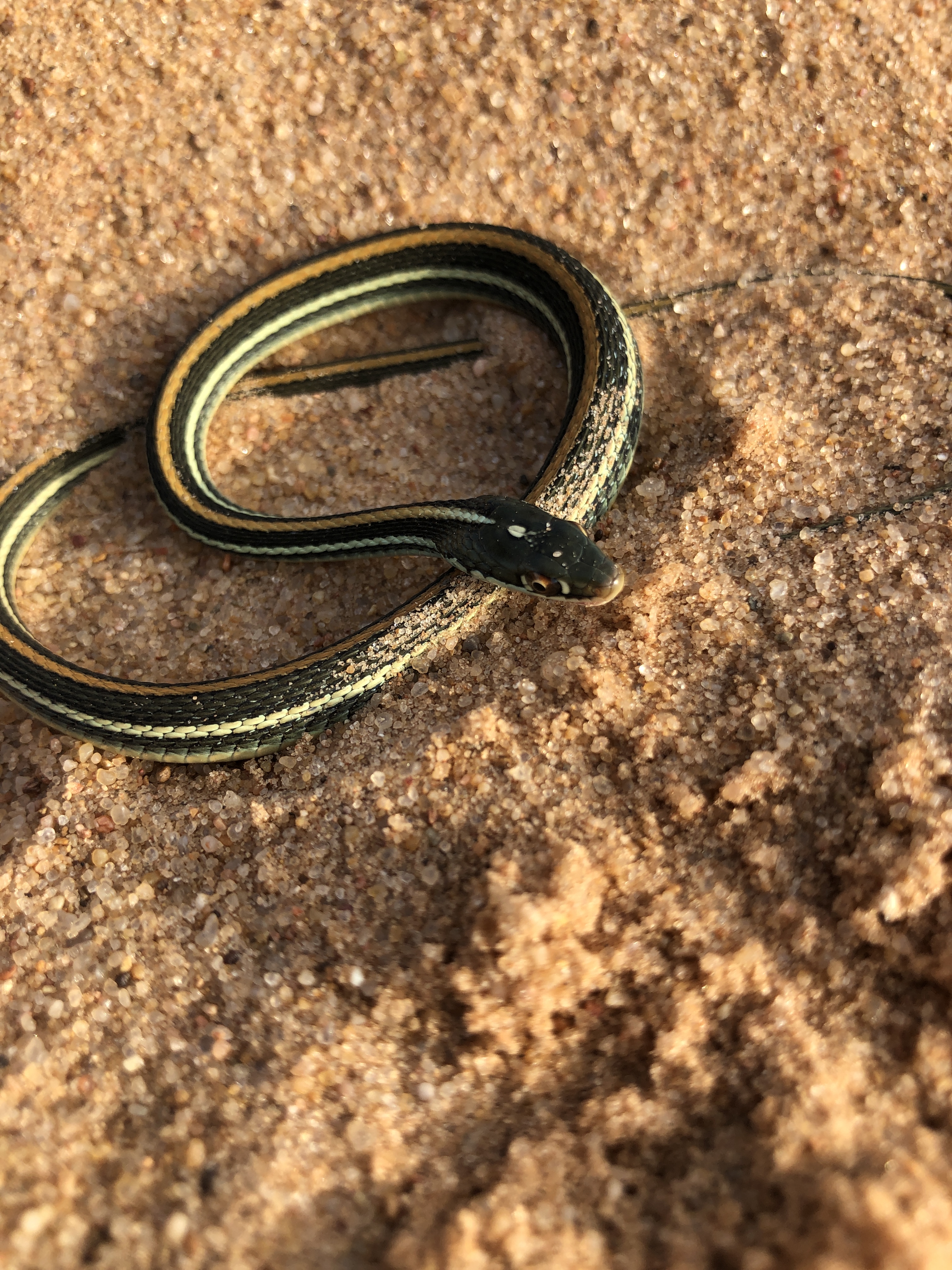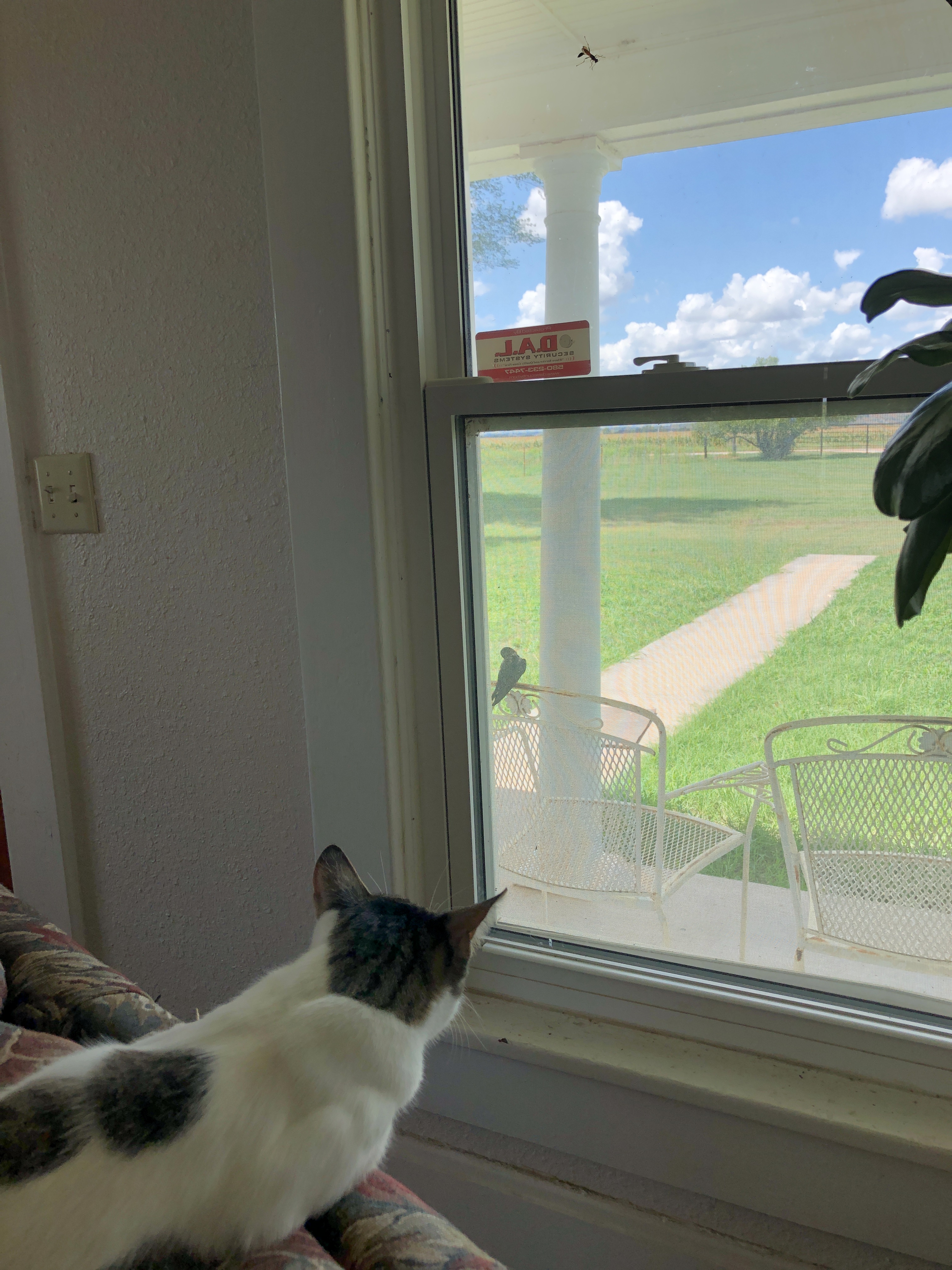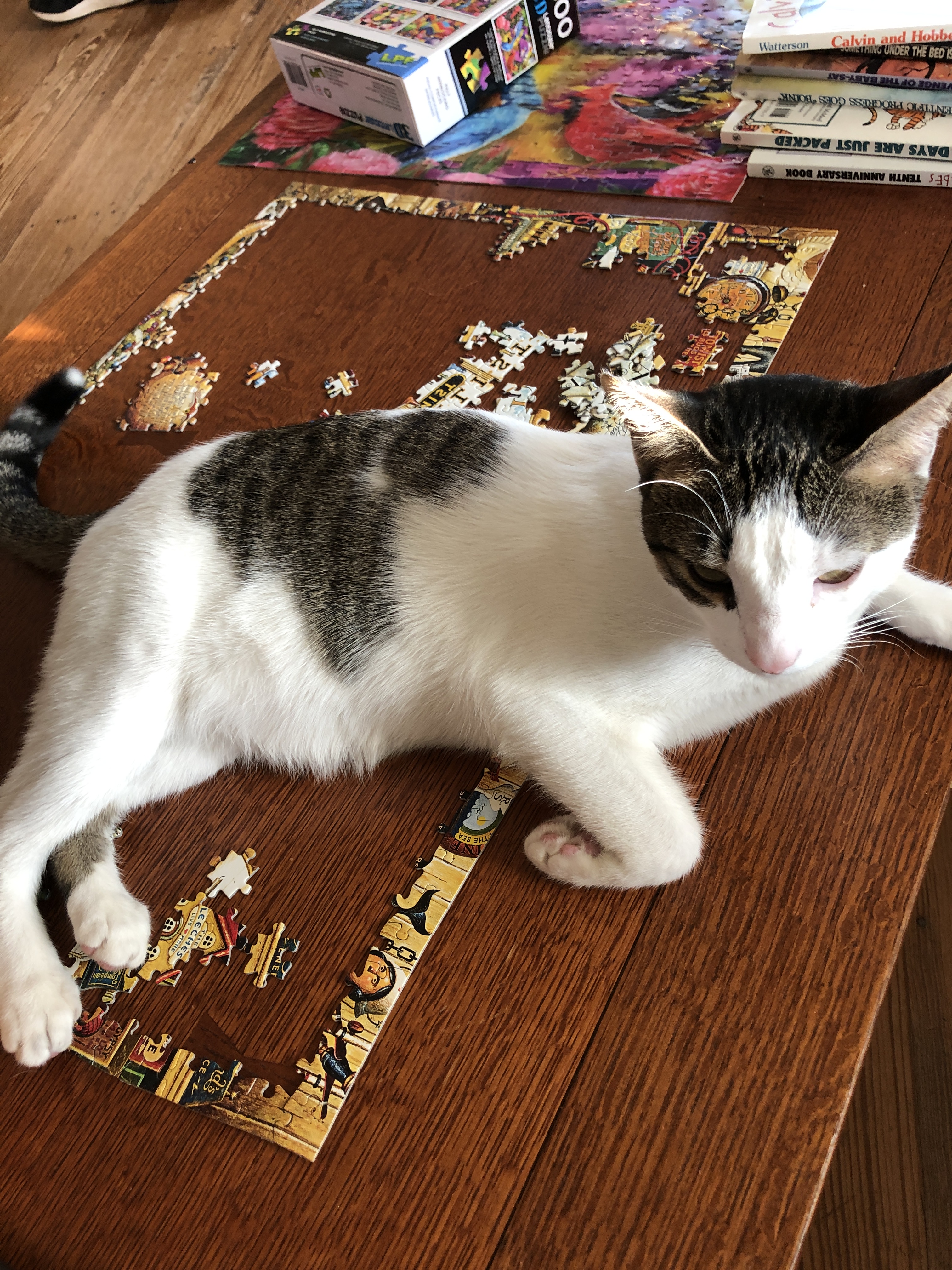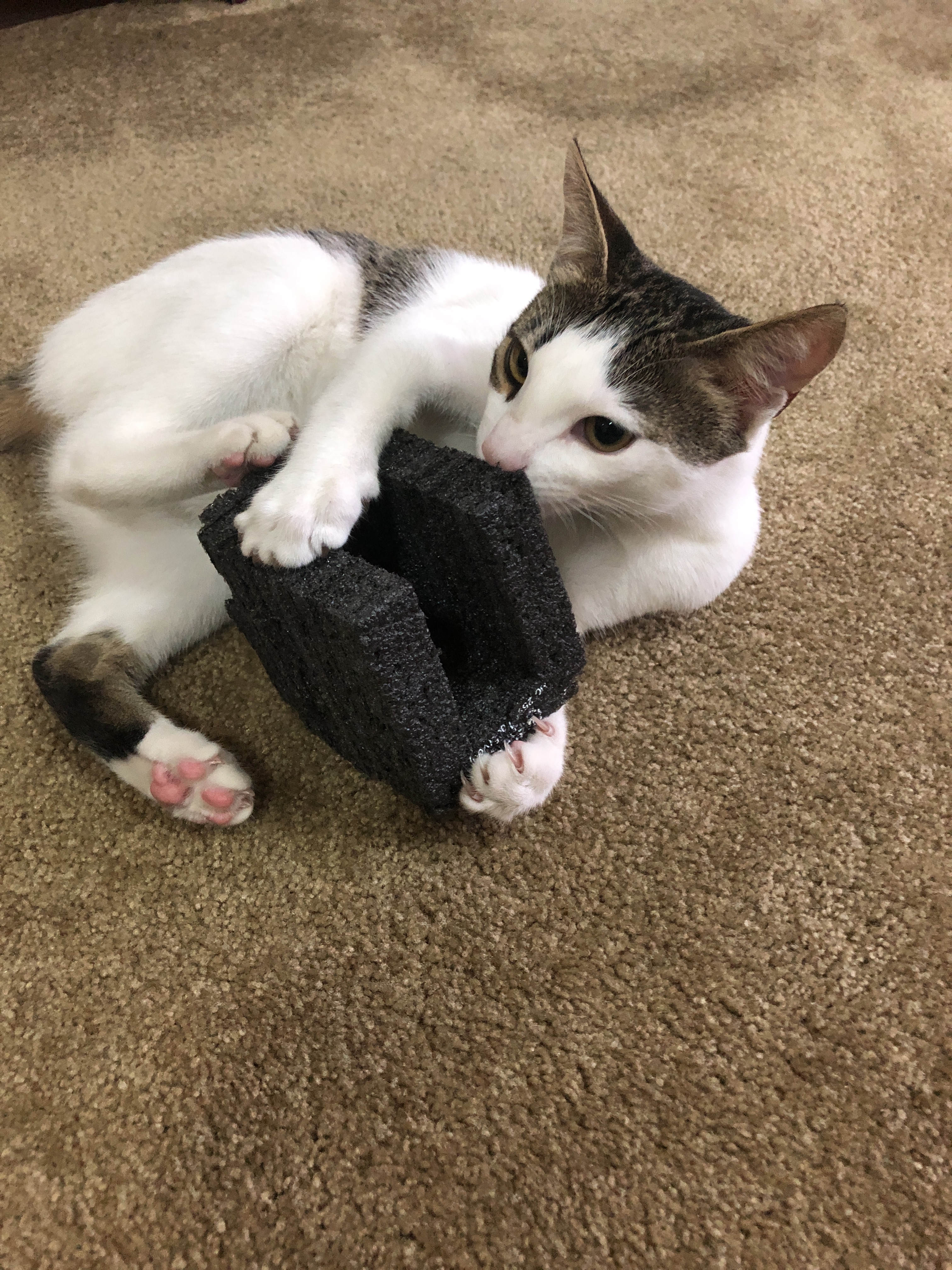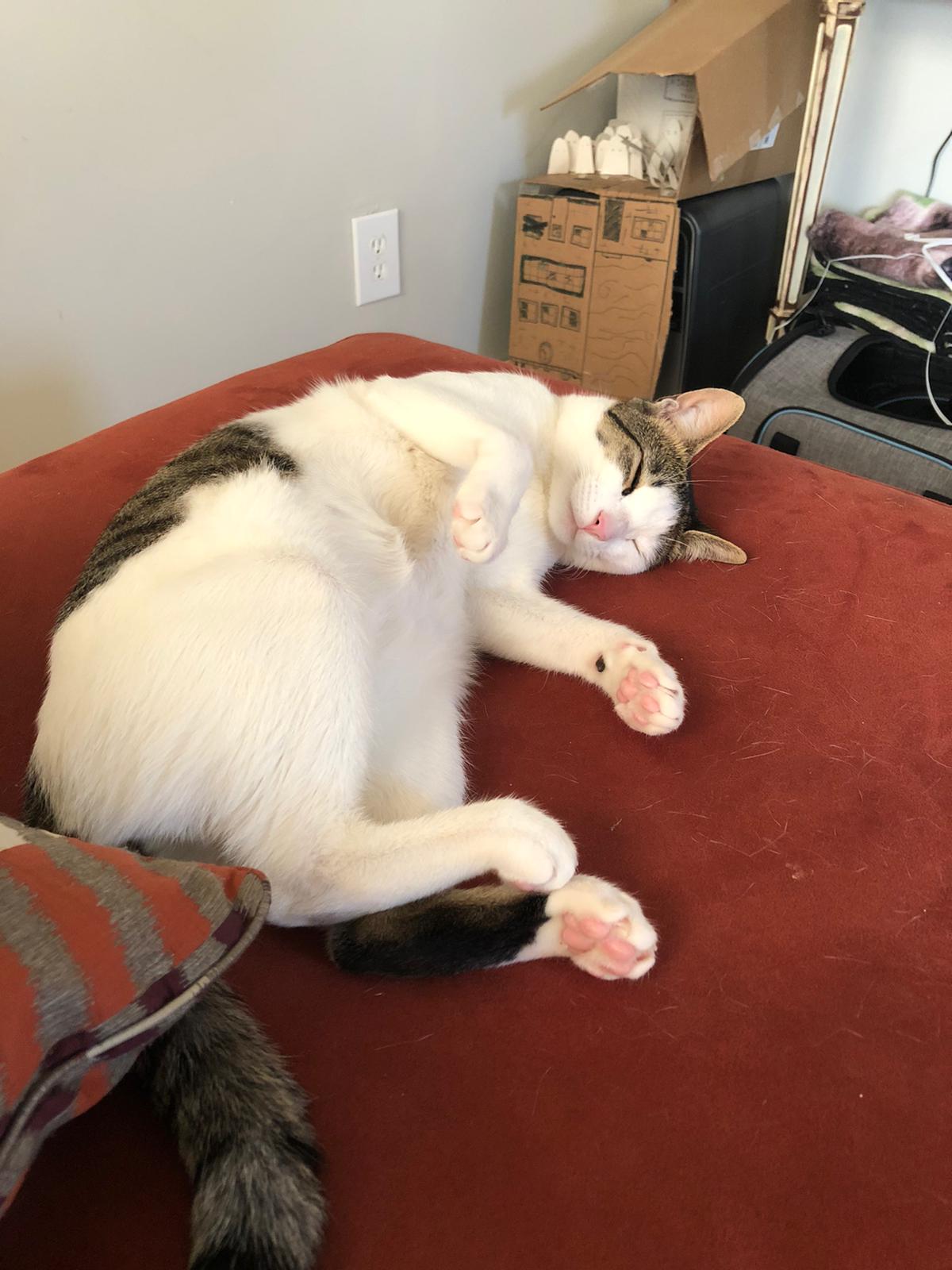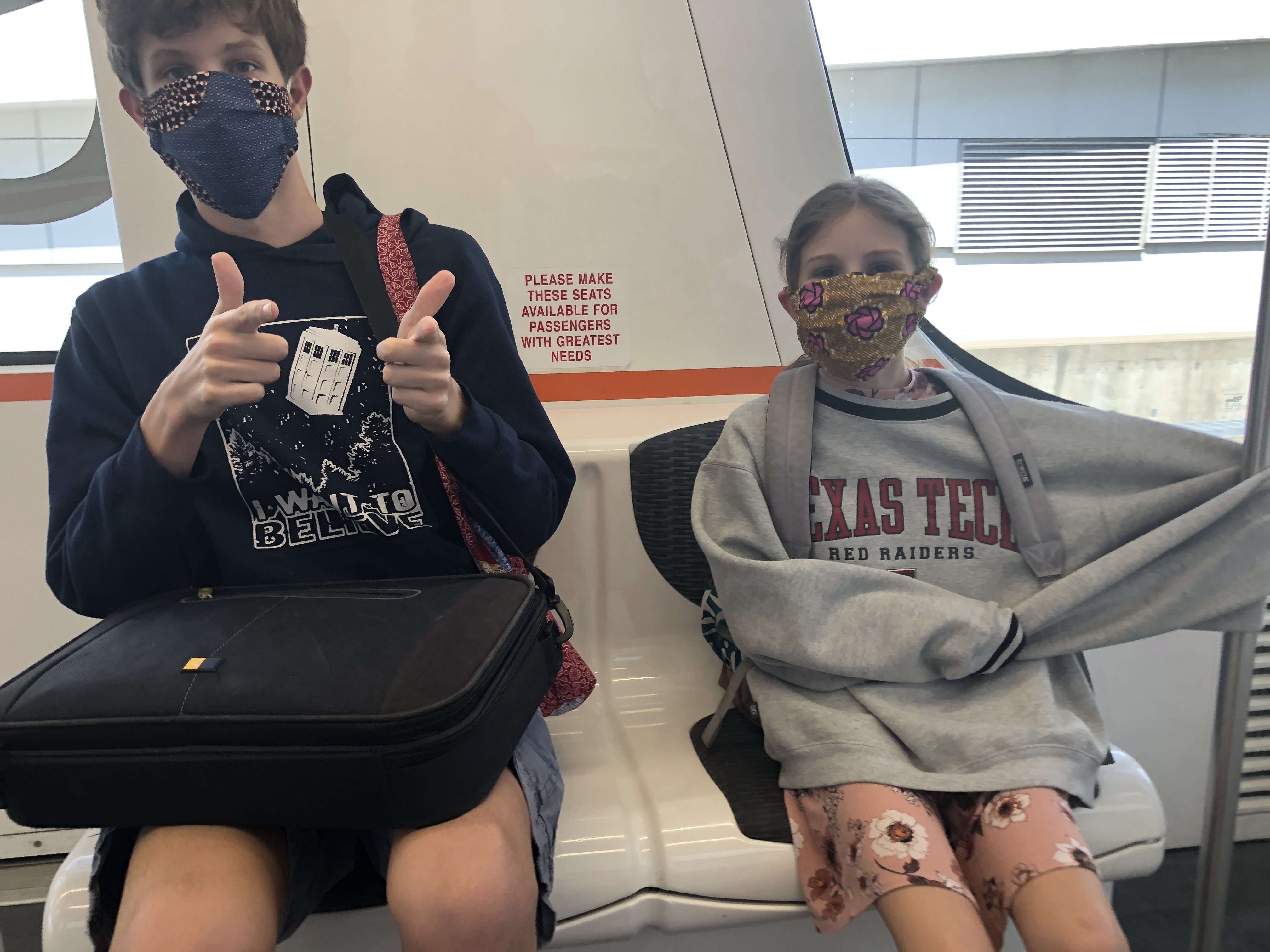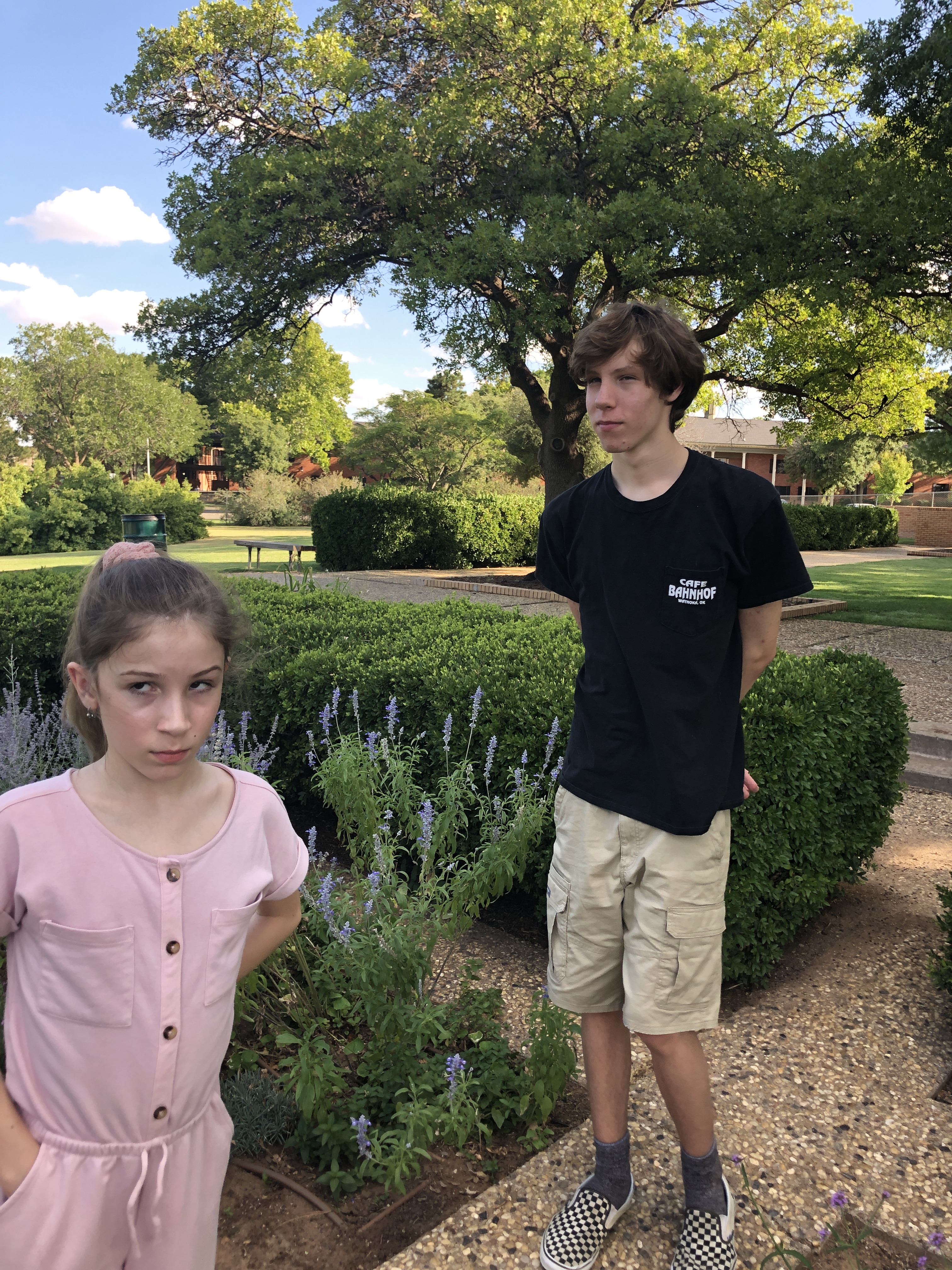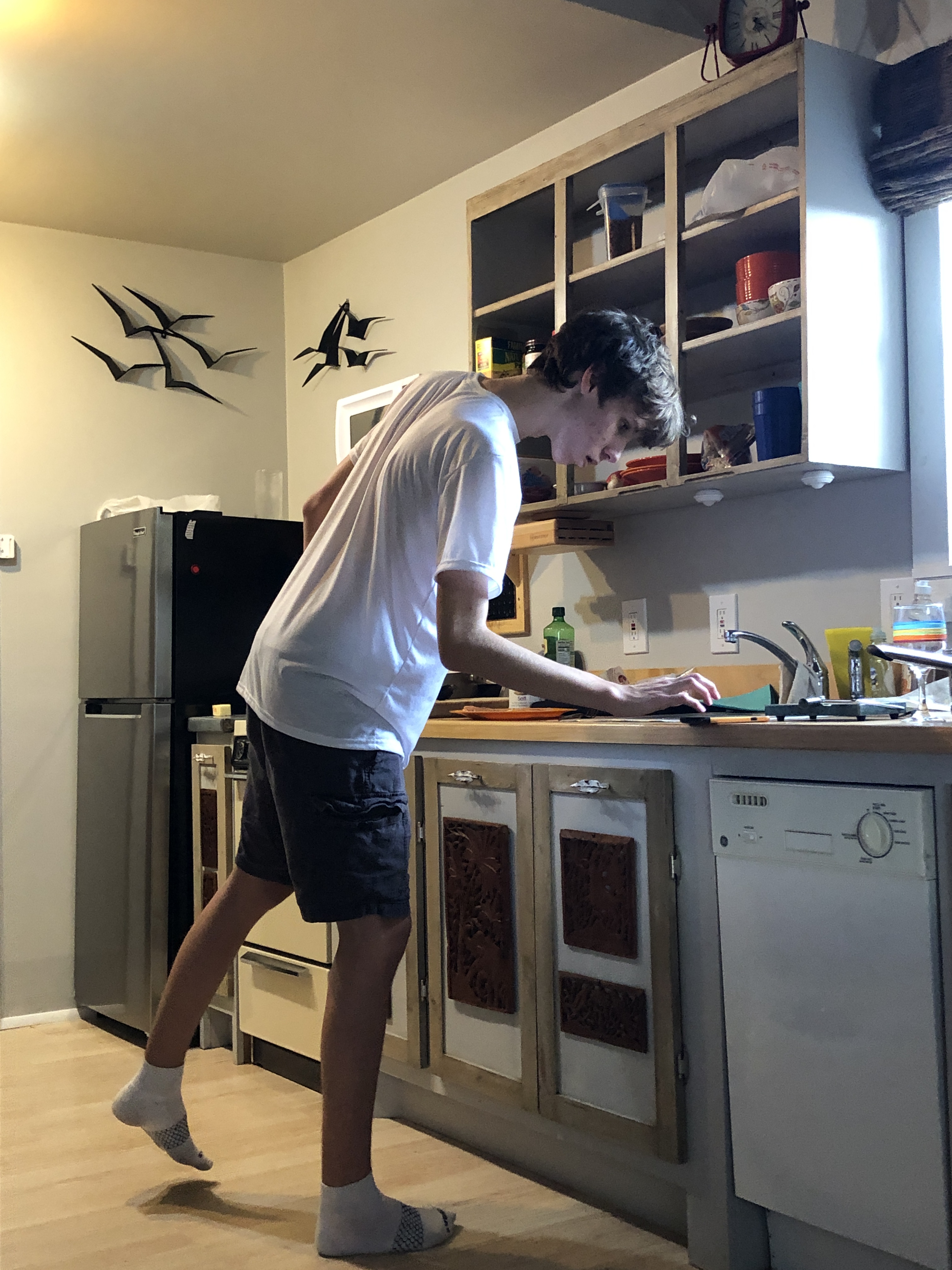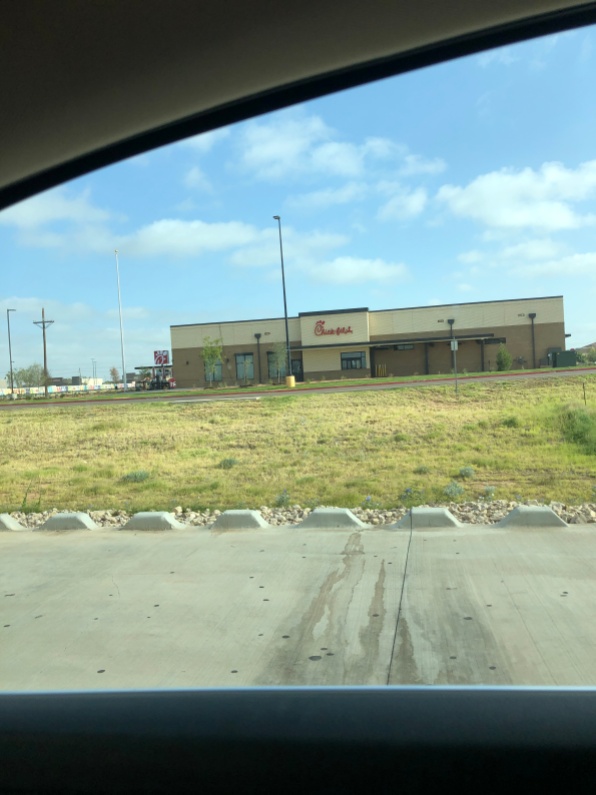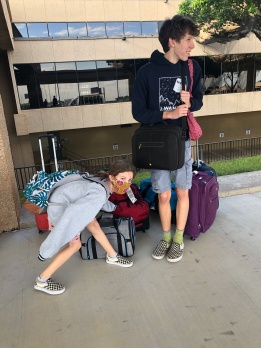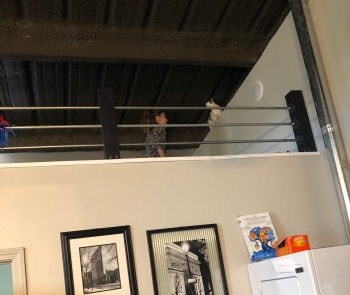I’m sitting in a comfortable, cozily furnished room looking out (through an open window, no less) on a grassy expanse peppered with sunflower sprouts. A cotton field is just across the road. The road, which surely at one point was a sparsely traveled country road, is periodically busy with a ratio of about 3-to-1 pickup trucks to sedans. Marisela is about 8 feet overhead, playing Minecraft in her personal loft with a friend in Dallas. Isaiah is in his own casita maybe 30 meters away, doing his laundry and playing games online with his friends in Ghana. Andrés is roughly 6,800 miles away in Lagos, enjoying his first true weekend in about a month.
If it seems like we were very similarly situated not too long ago, that’s because we were. The kids and I are once again at the wonderfully non-corporate furnished rental property we discovered when we were preparing for our post-Ghana home leave. Andrés is once again in West Africa without us, doing the job he was commissioned to do, only this time under far more pressing circumstances. The lovely proprietors of this property very kindly checked in with me before renting out the big family house we called home last summer, knowing we were potentially on the verge of leaving Lagos. At the moment they checked in, however, we were in that brief and lovely stage when we had decided to stick together and wait things out in Lagos. Just a bit later, when word came down that families were encouraged to leave, the big house was rented, but two smaller places would be available, so here we are. Isaiah gets to experience a bit of autonomy and Marisela and I are roommates.
But let me back up a bit. Last I wrote there were many, many unknowns. A picture was starting to emerge, but it wasn’t yet clear. The Wednesday flight did, indeed, materialize. We were able to take Lucas (and, by lucky chance, the export certificate we had scrambled to acquire for him was set to expire the day after our flight). Flights from the east coast to Lubbock were available (though sparse, and we ended up spending a few nights in a Virginia hotel waiting for one) and our in-cabin cat was allowed on those flights as well.
Many of the other questions still remain. State Department’s worldwide authorized departure order expires mid-May, but the order was issued with the possibility of month-at-a-time extensions. It’s hard to believe an extension won’t be announced sometime soon. Even as some European cities are beginning to open back up, or to discuss opening up in May, Lagos is only just now seeing cases rocket skyward. When we left there were about 250 confirmed cases in Nigeria. There are now (just over two weeks later) more than a thousand, and about 3/4 of those are in Lagos. Lagos, the city of 20 million people. With many, many residents for whom staying home and social distancing are near impossibilities. Lagos is likely only at the very beginning of the pain this virus is going to inflict. I hope I’m wrong. I truly do. It might be quite a while before we can return.
That’s the rundown of the current situation for us. Here are the minute details, for those who might like them:
We left Lagos on Wednesday, April 8, with Lucas in tow. The Lagos airport, usually packed, was virtually empty. Andrés was at the consulate that day but his colleagues helped us, along with about 300 other citizens (only a handful of whom were associated with the consulate), get checked in, screened, and onboard an Ethiopian Airlines flight specially arranged to take us back to the US.
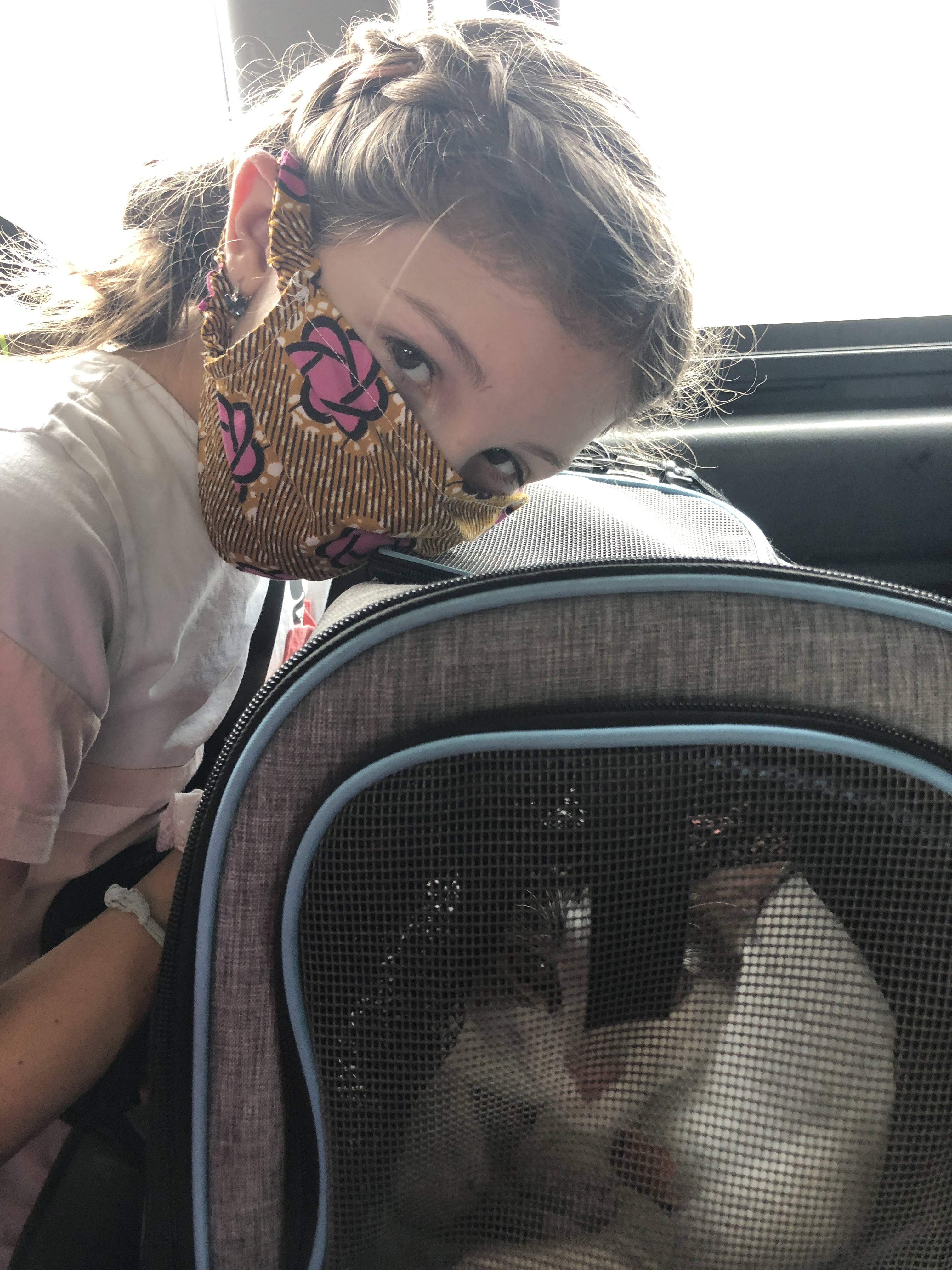
The flight was an adventure. We departed around 4:00 pm and were scheduled to arrive at Dulles around 10:00 pm. In theory, it seemed like decent timing. We’d get settled, eat dinner, maybe watch a movie, and then maybe nap a bit before arriving, and then get to our hotel in time for a solid night’s rest. Our original schedule had us back at Dulles around 4:45 am to check in for a flight to DFW and on to Lubbock, but we already knew that Lubbock flight had been cancelled. We were scheduled instead to fly out of National the following day. Really, about as forgiving a schedule as we could hope for.
About 45 minutes in, all hope of a restful flight vanished. We hit the worst turbulence I’ve ever encountered in my many years of flying. After a few intense but run-of-the-mill bumps it felt like we plummeted, not once but twice in succession. Marisela’s Kindle flew out of her lap. I felt strangely like my organs were somehow untethered and floating in midair. I’m sure that in reality the drops were small, especially in the context of the altitude at which we were flying by that point. But they didn’t feel small. And we were not the only ones alarmed. Most of our fellow passengers were US citizens of Nigerian origin who had been visiting family when the airport closed with only a few days’ warning. Religious expression in West Africa, in our experience, is vigorous and voluble. As soon as the turbulence hit, the airplane cabin erupted in prayer, hymn-singing, and calls upon the Almighty. The grandmotherly woman seated immediately behind us was rocking back and forth, eyes closed, intoning, “Blood of Jesus! Blood of Jesus! Blood of Jesus!” There’s a definite culture gap here: what our flight companions surely found reassuring we found an alarming, inescapable reminder that things were not OK.
Of course things really were OK. They didn’t feel OK, though, and that feeling stayed with the kids throughout the flight. They had never even experienced a seriously bumpy flight, so this was truly alarming for them. We had stretches of reasonably clear flying, but they were interspersed with bumpy patches for the whole 11-hour flight. No more dramatic drops, but plenty of jolts and jumps. Through all of this sweet little Lucas uttered not a single meow. It was one of many mercies this trip afforded. But Marisela could not settle. Every bump renewed high-alert status. Her terror was real, and it was infectious. Isaiah hardly slept. I slept not a wink, except possibly in patches of self-preserving micro sleep. My presence was needed to keep fears as far at bay as possible, which is to say not very far. I don’t think I’ve ever been happier for a flight to end.
You might wonder what kinds of controls were in place when we arrived on an international flight to an area of the US where infections were rising dramatically. The surprising answer: almost none. We had filled out travel history and contact-tracing forms on the plane, which included indicating where on the plane we were seated. Nobody ever collected them. There was no hand sanitizer offered anywhere in the airport. There were no temperature checks. Although there were signs posted and stickers on the floor indicating the need for six-foot distancing, there was no enforcement taking place and lines for customs did not always allow that amount of space. Granted, we were coming directly from a country with a much lower confirmed case count, and we had been checked for body temperature and asked about symptoms and any known contact with the virus as we left Lagos. Still, it was a bit of a shock to experience so little vigilance (OK, no vigilance) taking place at Dulles.
By the time we collected our luggage, found the shuttle site we needed, and arrived at our hotel it was nearly midnight. We set up a temporary litter box and food and water bowls for our feline companion and were ready to crash. Except for Marisela, of course, who had a new wave of energy. She had to check out the coffee maker and have a decaf (??) before settling in for the night (for the record, this is something she has never had or expressed a desire to have in the past). I did not have the energy or presence of mind to muster enough parental authority to stop her.
We slept, eventually. Lucas slept, burrowed under every layer of blanket on our bed. We spent about 30 hours ensconced in this little pocket universe of hotel bizarroworld. Corridors were empty. The staff was a skeleton crew. Food had to be ordered in person in the restaurant for takeout to the rooms (I think they didn’t have enough staff on hand to take call-in orders?). There was no housekeeping service except between guests. A restaurant employee told me the hotel had cut staff in half in recent weeks. Things had certainly begun to change in Lagos by the time we left, but this felt different. We little to no interest in a “normal” hotel experience, though, and were able to get what we needed: sleep and some time to breathe and recover from our harrowing journey.
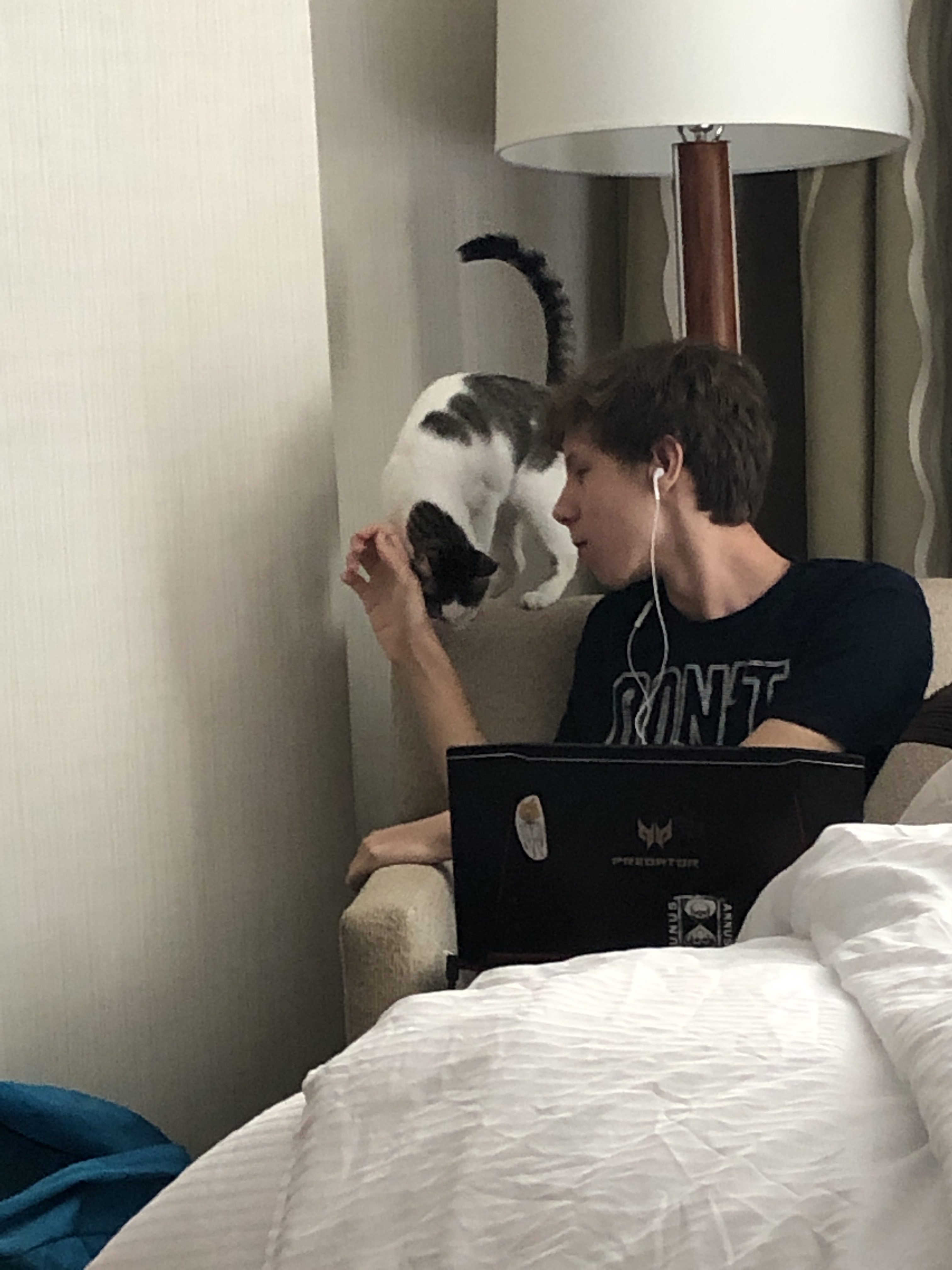
Friday we were on our way again. Our original flights had been out of Dulles, but the rescheduling left us flying out of Reagan National, so we had to load ourselves, the cat, and our six bags into an Uber XL with the help of a driver who clearly would rather not be working in the midst of a pandemic (and I cannot blame him at all; we wore our masks and tipped generously). The flights were fine. The kids were champs. So was the cat. Nobody was thrilled to be back on planes, but everybody just did what had to be done. We were quite thankful for Marisela’s thoughtful selection of a cat carrier with zip-out panels to make more room during layovers. Lucas enjoyed (well, that might be a bit strong of a word . . . maybe tolerated better) the airport time with the extra space. Through all of this, he would periodically let us know he was still there and not 100% on board with what was happening, but he was a true angel kitty: never protested loudly enough for anyone other than us to hear, and never messed his carrier. It was one of the great reliefs/surprises of the journey: having him along was actually not burdensome, and the comfort he brought made the trip easier.
By the time we touched down in Lubbock and retrieved our suitcases Isaiah with his sizable head had busted the elastic straps on his two masks (sewn by Marisela, by the way), but we were *almost* at the end of our journey, and would be driving our own car from the Lubbock airport to our home-for-now. That’s thanks to my sister and her family. They met us at the airport with our car, which was loaded with welcome decorations, some essential groceries, kitty litter, kettle bells, and delicious home-cooked food we’d enjoy over the next several days. We greeted each other from an appropriate distance, thanked them, and hightailed it to Cozy Homes.
We arrived in Lubbock on Good Friday. From Lagos I had ordered cat supplies and set up a curbside grocery pickup for Saturday. I was determined to truly make Easter feel like Easter and to make a meal worthy of the most celebratory day of the Christian calendar. Unfortunately, the ham I had ordered was out of stock by the time the groceries were assembled, as were a few other key ingredients. Thankfully Instacart delivery and Sprouts came through for me and we ended up with a massive ham we will probably be working to finish throughout our evacuation. The rolls, by the way, were made with flour I’d brought from Nigeria: white flour from the supermarket and whole wheat ground from the wheat we’d purchased from John’s Farm and put in our consumables shipment. That was some well-traveled bread.
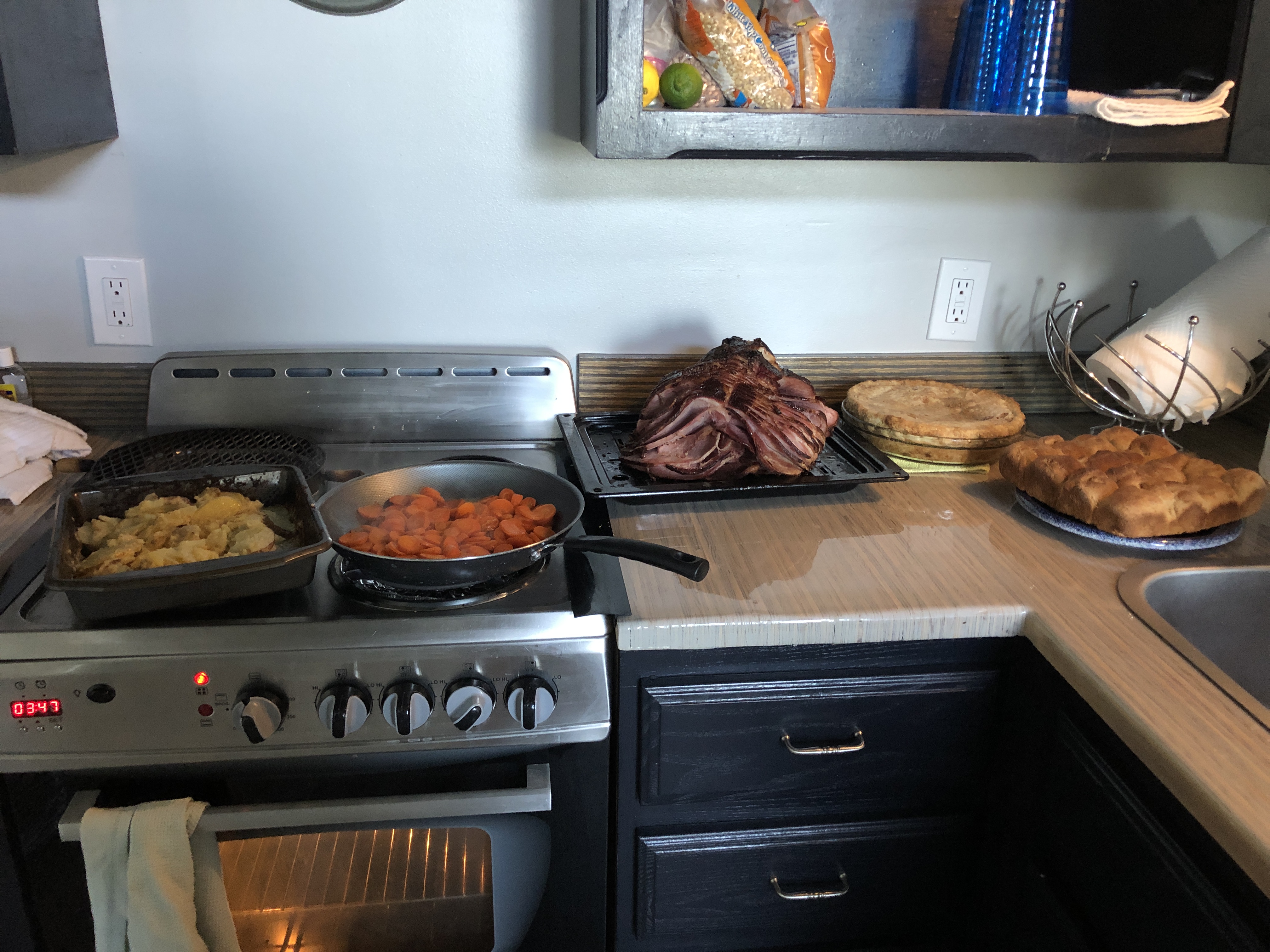
The National Cathedral in Washington has incredible online services. Presiding Bishop Michael Curry’s sermon, followed by a tear-jerkingly beautiful Zoom choir/orchestra rendition of The Strife is O’er, The Battle Won made it truly feel like Easter was still Easter. I was also able to join my cousin Brad’s Easter service in St. Luke’s Episcopal in Stephenville, TX. For all the disconnection this virus has caused, it has also drawn me closer, in some ways, to people I love around the world as we are all now socializing and connecting online.
It’s been nearly two weeks since we enjoyed that feast. There was more than a touch of sadness in making such a meal just for the three of us, when we would far rather be sharing it with Andrés and many others. But it was the best we had and we made the most of it. We took my parents some ham and scalloped potatoes and cherry pie, depositing our offerings on a chair in their garage and returning to their driveway so we’d be far away when they retrieved them. Over the last few weeks we’ve refined and perfected this routine, finding ways to be together at a significant distance. Walking my parents’ dog, Lizzie, has been a highlight for all of us. We’ve also enjoyed virtual board game sessions with my sister’s family and are hoping for more of that this weekend.
One bit of excitement we hadn’t anticipated: snow! It wasn’t much, but it was the first snow the kids have seen since Mexico. And the only cold weather they’ve felt since, I’m guessing, March or so of 2017. It made for a cozy morning. Marisela still has the little snowball stored in our freezer.
Our home routines are taking shape now. We’ve each carved out spaces and schedules that work reasonably well. Lucas seems perpetually amazed by the wide-open spaces he sees out the windows (and the birds he can imagine stalking). He quickly mastered the ladder/stairs up to Marisela’s loft, and he alternates between Isaiah’s casita and our apartment. He’s comfortable in both spaces now and while I can’t say he enjoys being poked into his carrier to transfer from one to the other, he does seem to appreciate having time with all of us. Dinner tradition is to eat together wherever Lucas is living at the moment and then to spend the post-dinner hour wearing him out in the hope of helping his host(s) enjoy a full night of sleep.
I cannot complain about the fact that I still have a job, and that it’s kept me busy lately. In the midst of all of this upheaval we’ve finalized the textbook I was working on, got it sent off for printing, and in the two weeks I’ve been in Lubbock I’ve written the lesson plans for the instructor’s guide. This coming week I’ll finalize the teaching tools that make up the instructor’s guide appendices, and before long I will be holding the book in my hands. Oddly enough, I started work on this book at Cozy Homes last summer, and I will finish it just across the property from where my work began. Then (most likely) I’ll be starting another new book that will, I am hoping, be finished in Lagos.
The kids have been working hard, too. Online school is no joke, and I know the kids’ teachers are doing everything they can to make it the best experience it can be. The uncertainty of our life right before leaving Lagos made it tough to stay up with classes, and the vast number of messages, videos, and other communication attached to each assignment really can pile up after just a short amount of time. Marisela, in particular, found the transition challenging but has been working hard to catch up again. It’s been a strange, strange school year.
The kids will continue with this online version of AISL until early June. In theory their classes are supposed to take about four hours each day. In practice, they’re both online from 8:00 am until 2:00 or 3:00 pm, and Isaiah has yet to have a weekend free of homework. While that’s no more time, hour by hour, than in-person school required, it’s a more draining experience for them, and it leaves us all with less down-time than we’d like. Most of our days are pretty tightly scheduled, but at least I can say we are finding time to get exercise, enjoy family (from a distance), talk to Andrés, and have meals together.
Speaking of Andrés, he’s still doing what needs to be done, working hard and enjoying the company of his consulate colleagues who remained at post. There was one “last” repatriation flight over this last weekend, bringing the total of Americans for whom the consulate has arranged repatriation to nearly 1400. The airport remains closed, though, and there are still people who have expressed interest in leaving but who have yet to leave, and so there may well be more flights in the future. Andrés and the rest of the consulate crew are keeping spirits up and doing all they can. We all miss him (and our home and neighbors) terribly.
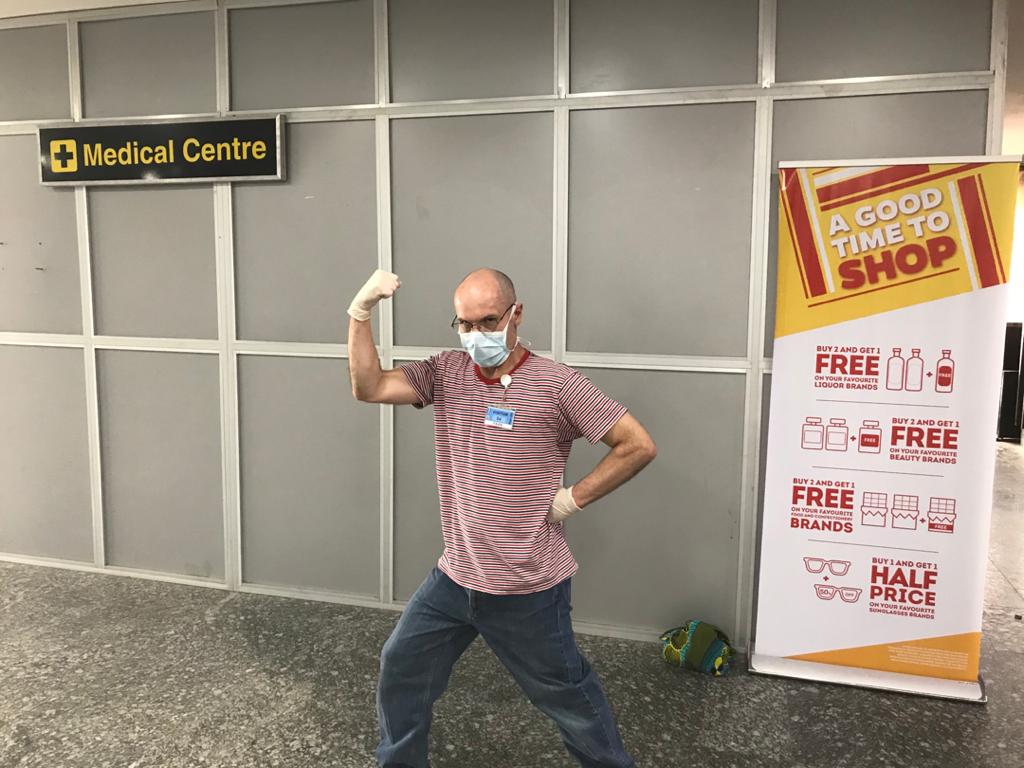
Right now I’m enjoying a weekend of true rest and recuperation. No big meals planned. No curbside pickups to get our new homes set up (very thankful to have the resources to set up, yet again, from scratch, but a little bit tired of doing this given that we had home leave setup last August, Lagos setup in October, and now we’re here all over again). A few kitchen projects with Marisela. Probably some yoga and walks. Sitting by the pond here at Cozy Homes. I might even manage to read again. It’s been a while. Things are beginning to feel as normal as they’re going to feel.
Many thanks to all of our friends and family for the love and encouragement. We love everyone right back, and we could not do what we do without our worldwide emotional safety net. Thank you and we wish everyone peace and safety.
